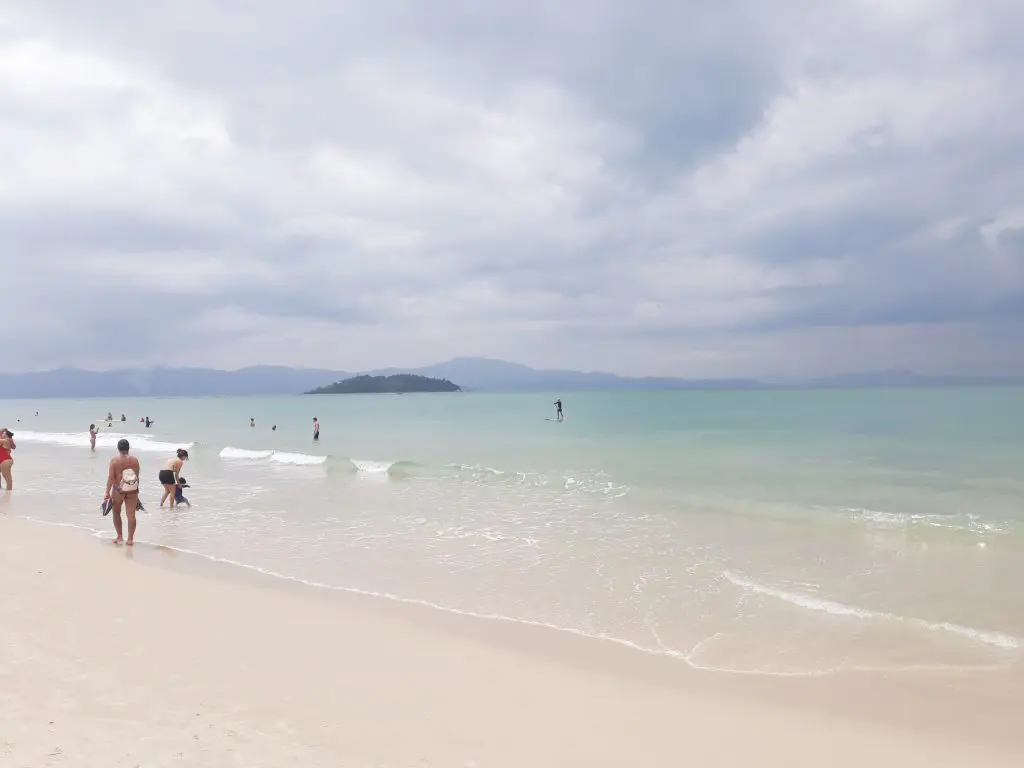Imagine living longer, healthier, for much less?
Most European countries have a lower cost of living than Tennessee, and for such low prices, you get really good quality of life
And a much higher life expectancy!
So you pack your bags, land in your dream country in the old continent…
But here’s the twist: you discover there’s no visa that allows you to stay longer. That’s the reality in several EU countries.
But not all.
I spend the last 5 years helping people to move to Europe, and it stills surprises me how different are the rules in each European nation.
Some EU countries require €4,500 a month just to consider your application. Others? Less than €800.
Today, I am ranking all 27 EU countries from the hardest to the easiest to obtain a temporary residence visa. And watch until the end, because by the time we reach the top countries in this ranking, you’ll see just how simple—sometimes shockingly simple—life abroad can be.
The Criteria
This ranking looks only at temporary residence visas. For most non-EU citizens, that’s the entry point to living in Europe. After a few years on a temporary permit, you can often move to permanent residency and eventually citizenship.
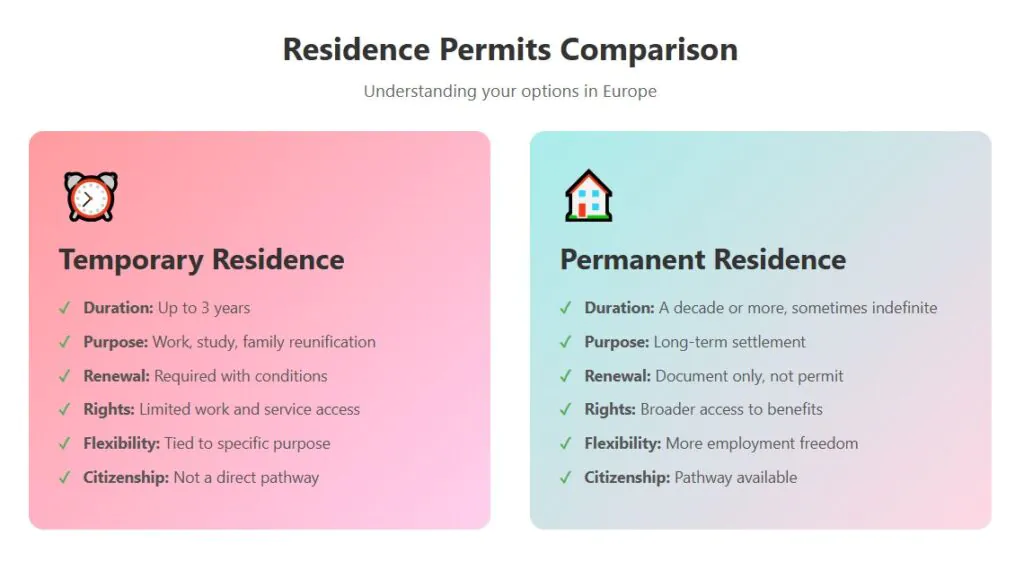
We rate and rank each country based on three factors:
1 – Do they have a visa for pensioners, retirees, or remote workers?
2 – How big is the financial proof you must show, and,
3 – How demanding and time-consuming the process is in practice.
The order runs from the most restrictive—where staying long-term is nearly impossible—to the most open, where rules are clear and thresholds are low.
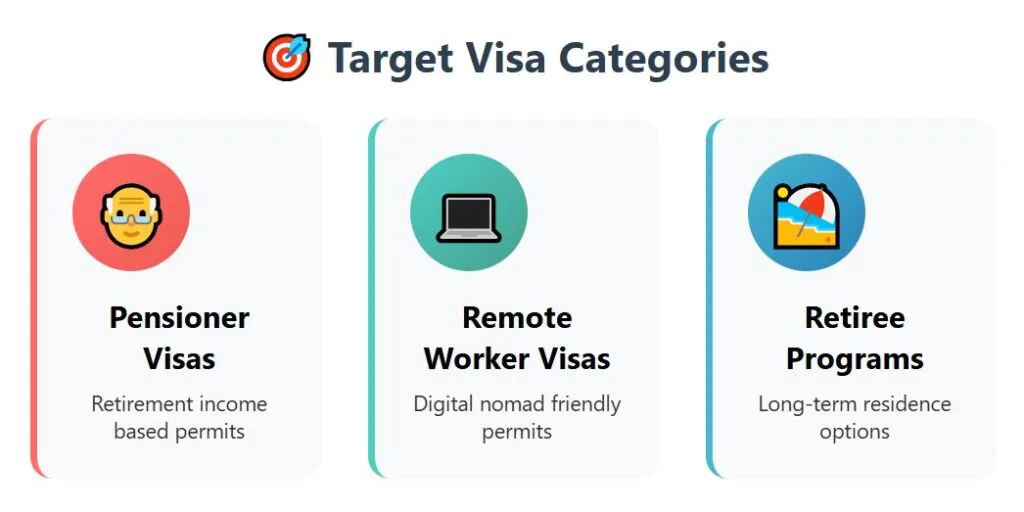
Our main focus in this ranking is residence as a retiree, pensioner, or remote worker – NOT residence by investment, but if you want me to rank the EU countries on how easy is to obtain residence by investment, let me know in the comment section!
So let’s start!

The Hardest Country in Europe to Obtain a Temporary Residence Visa: Denmark
Denmark might look appealing from the outside—safe, organized, and with high living standards—but for non-EU citizens wanting to live there without a local job, the door is essentially shut. There is no retirement visa, no financially independent person permit, and no digital nomad visa. The only legal options are tied to work, studies, or family reunification.
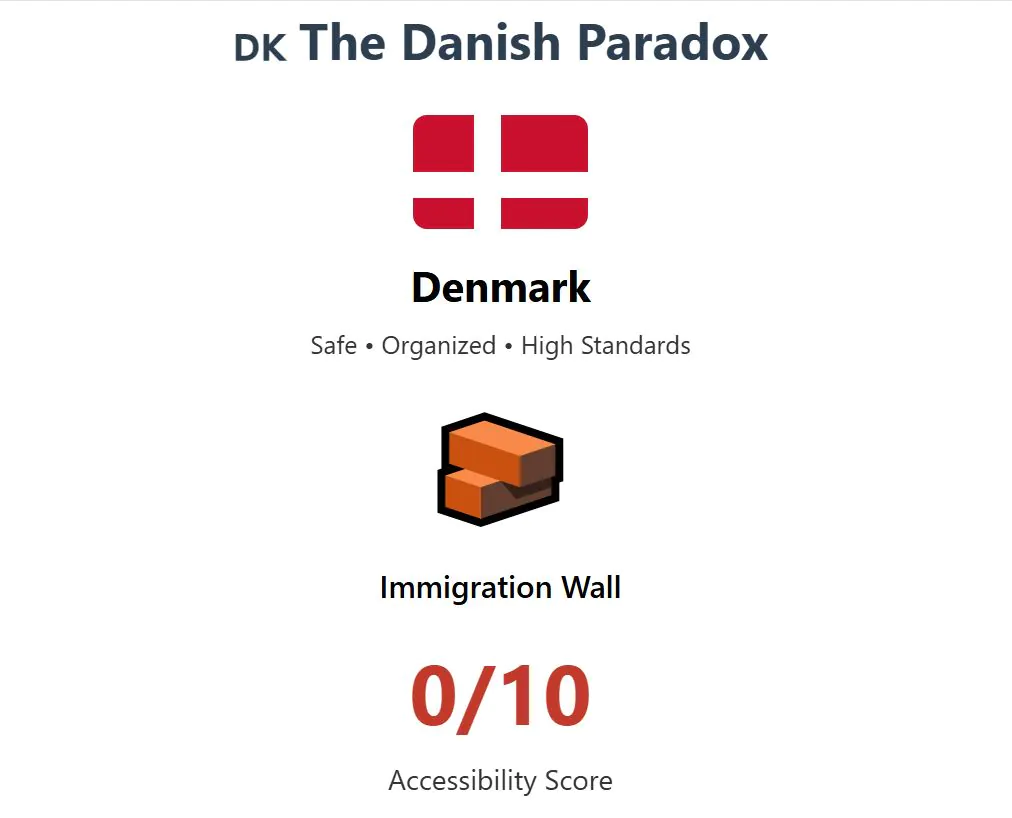
Even though most Danes speak excellent English and official information is often available in it, those advantages don’t matter without a matching visa category you can apply for.
Denmark ranks last in this list because the obstacle isn’t high income requirements or complex paperwork—it’s the complete absence of a program for FIPs.
And the Danes are restrictive beyond just temporary residence. In a previous ranking we made about the hardest and easiest countries in Europe for permanent residence, Denmark was considered the hardest.
This is what a local told us about immigration to Denmark:
“It is quite difficult to for non-eu people to gain entry beyond tourist visas. To study for a PhD is a possibility, but once again it requires you to be able to justify that your PhD is worth granting you entry. It is very difficult to gain access, and long term permission is even harder.”
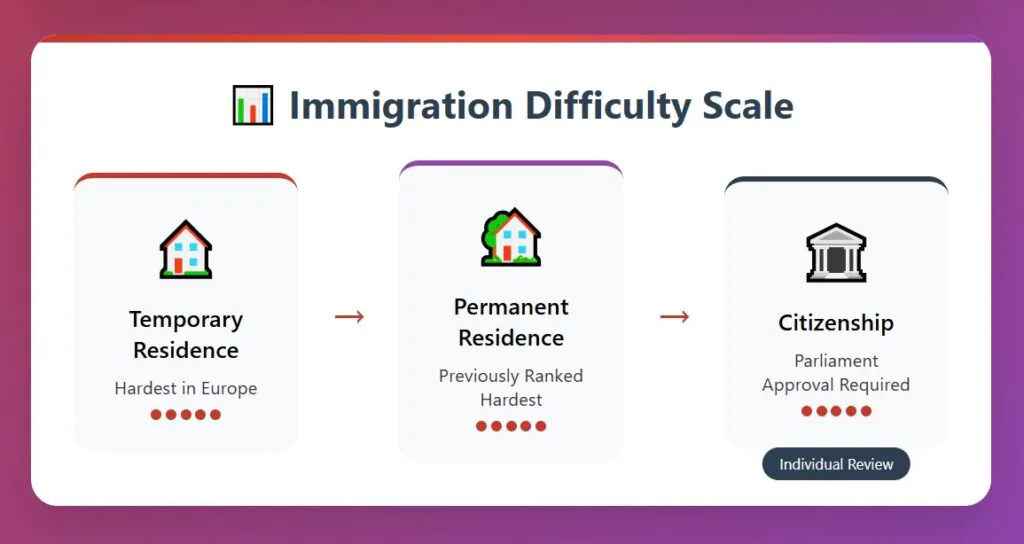
And when it comes to citizenship, the country is again among the strictest: each new citizen must be individually approved by the national parliament before their naturalization is confirmed.
Ratings—Requirements: 0; Process: 0.
By the way, I’m not saying that strict immigration laws are wrong—every country has its own reasons for having either strict or relaxed requirements. My role is as an expat consultant, not a political commentator. I’m not here to judge immigration policies, but to help you with them.
26 – Sweden
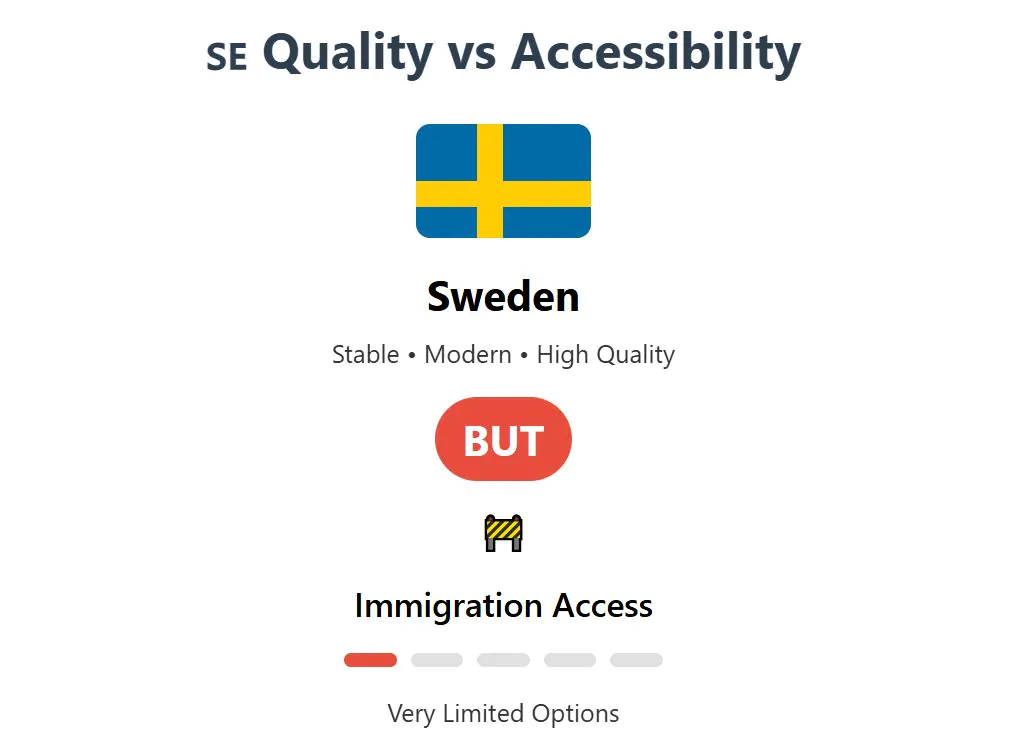
Sweden offers stability, modern infrastructure, and a reputation for a high quality of life. But if you plan to live there without taking a local job, the rules create a hard stop. There is no visa for retirees, people with passive income, or digital nomads from outside the EU.
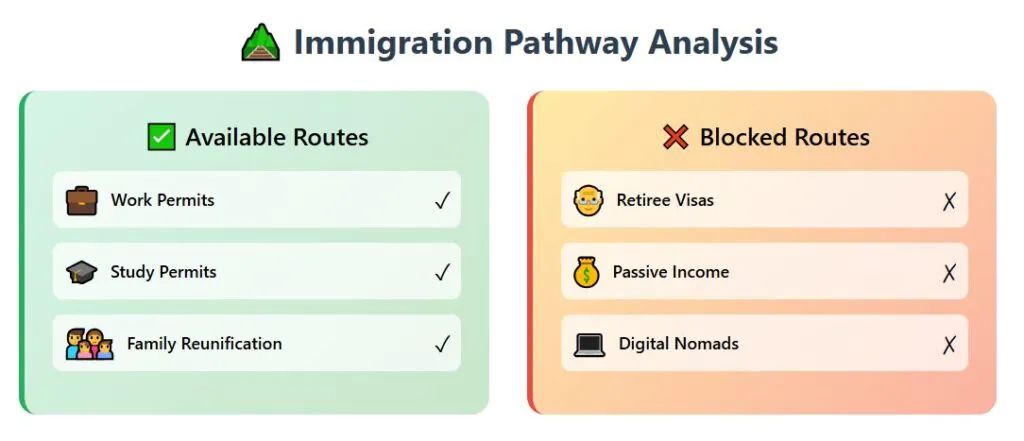
The legal options are narrowly defined: work permits tied to a Swedish employer, study permits for those enrolled in courses, or family reunification if you have close relatives there. For someone financially independent, none of these fit.
Ratings—Requirements: 0; Process & English-friendliness: 1. (Process is complex, but explanations exist in English.)
25 – Finland
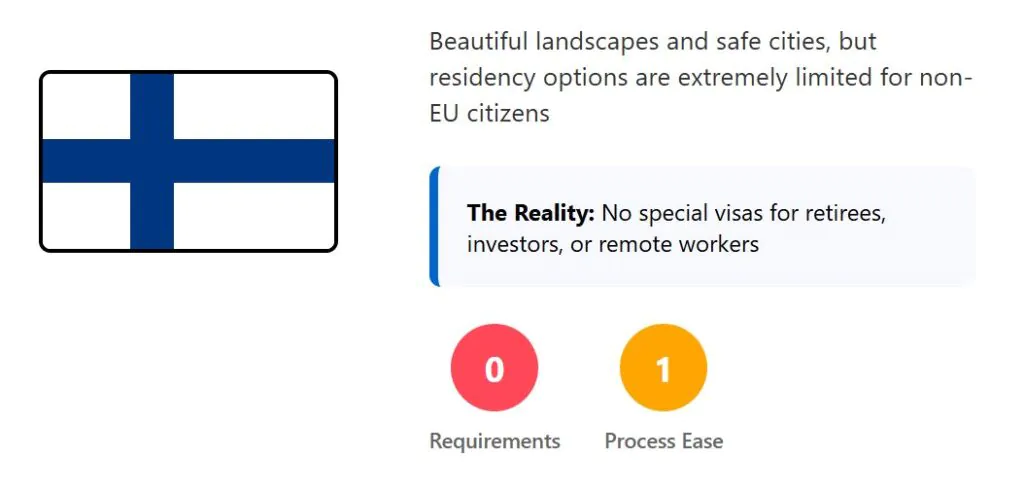
Finland is known for its lakes, quiet cities, and high levels of safety. But if you want to stay there long term without taking a Finnish job, the rules leave little room. There’s no retiree visa, no passive income route, and no digital nomad permit for non-EU citizens.
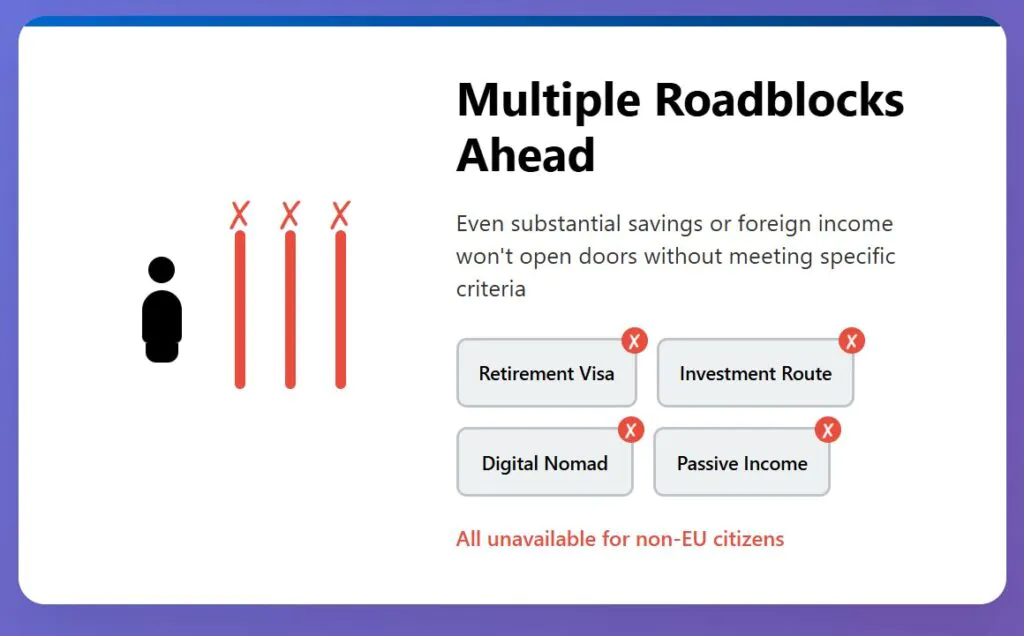
Residence permits are tied directly to work, study, or family connections. Proof of large savings or a steady foreign income won’t get you through the system unless you meet one of those core categories.
Ratings—Requirements: 0; Process & English-friendliness: 1.
24 – Belgium
Belgium sits in the middle of Western Europe, with quick train links to capitals all around. On paper, it sounds like a perfect base. In practice, there’s not really a visa specific for retirees, pensioners, or remote workers.
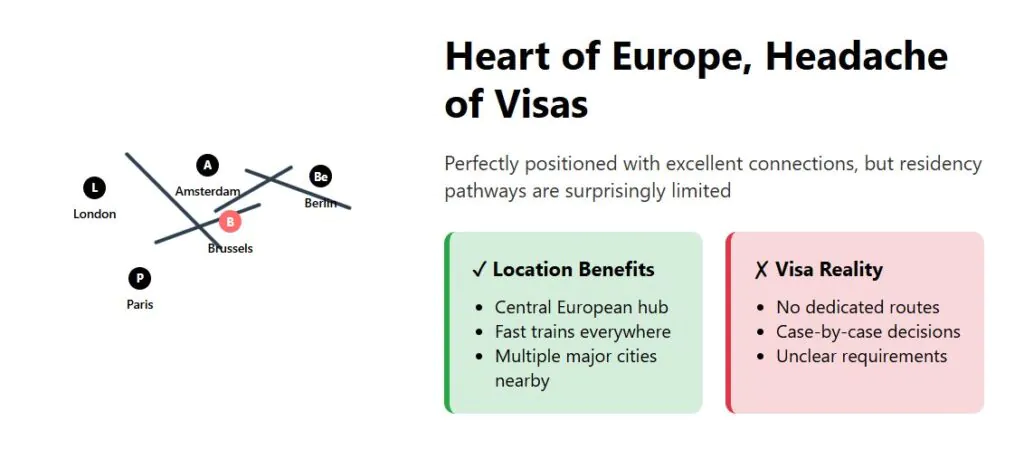
The so-called “financial independence” permit exists, but approvals are made on a case-by-case basis. Applicants must generally show substantial savings or income, and often a connection to Belgium (such as Belgian family, property, etc).
But it is all quite confusing.
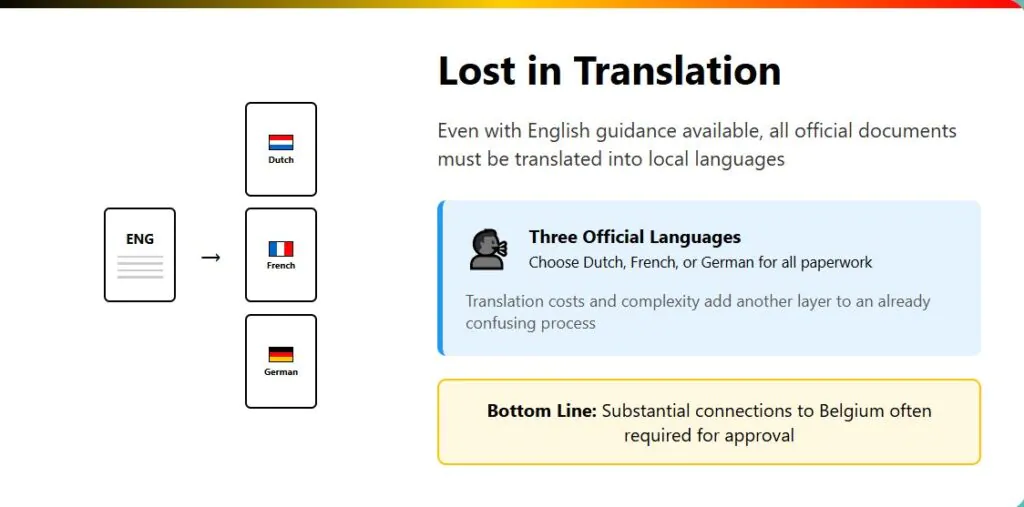
There’s no published minimum income, no set list of accepted documents, and outcomes can vary even between applicants with similar profiles. While some guidance is available in English, every document must be translated into Dutch, French, or German.
Ratings—Requirements: 1; Process & English-friendliness: 2.
23 – Poland
Poland’s low prices for housing, groceries, and services can make it look like a retiree’s dream. But if you plan to stay long-term without taking a Polish job or starting a local business, there’s no direct visa option for passive income or pensions.
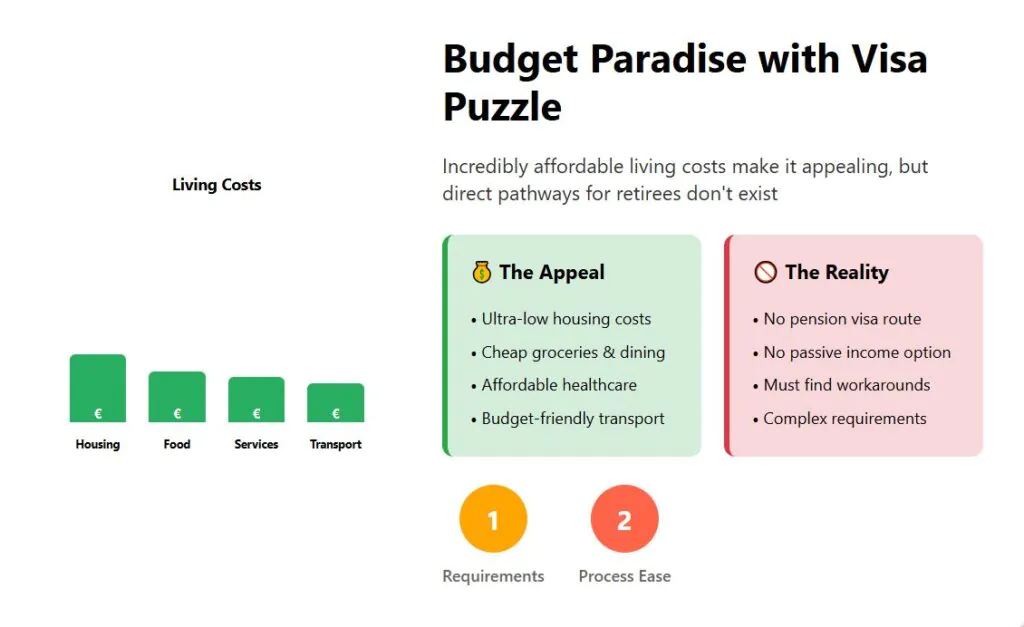
Most applicants end up relying on work, study, investment, or family grounds. Some try the self-employment route by registering a sole proprietorship, but that adds tax filings, business plans, and proof of activity—more of a workaround than a clear right.
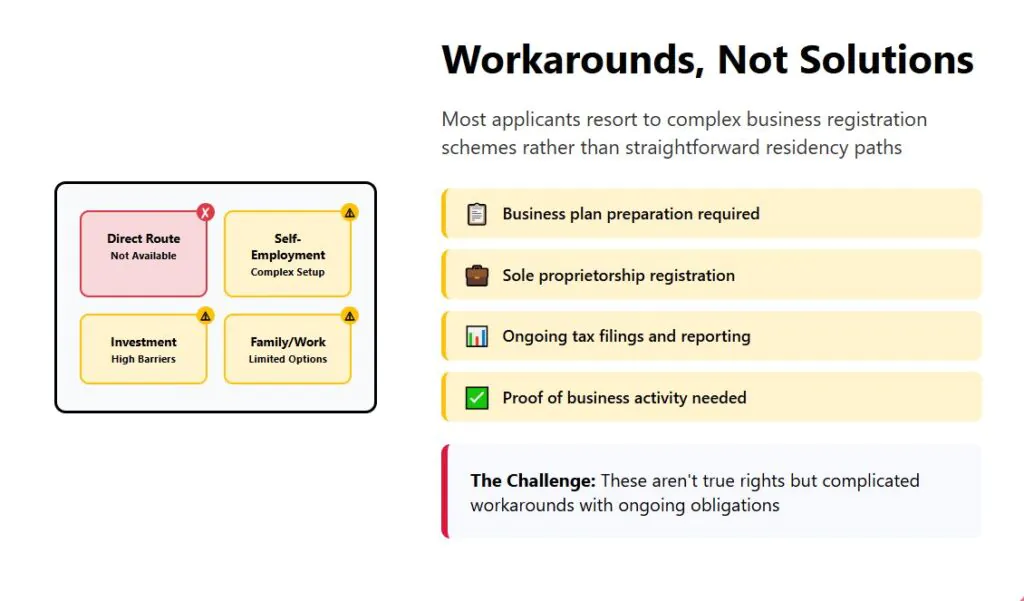
All applications must be prepared in Polish, and most require certified translations. As someone who speaks Polish, it is not an easy language. Poland earns the same score as Belgium.
Ratings—Requirements: 1; Process & English-friendliness: 2.
22 – Slovakia
Slovakia does not have a specific visa for non-EU FIPs.
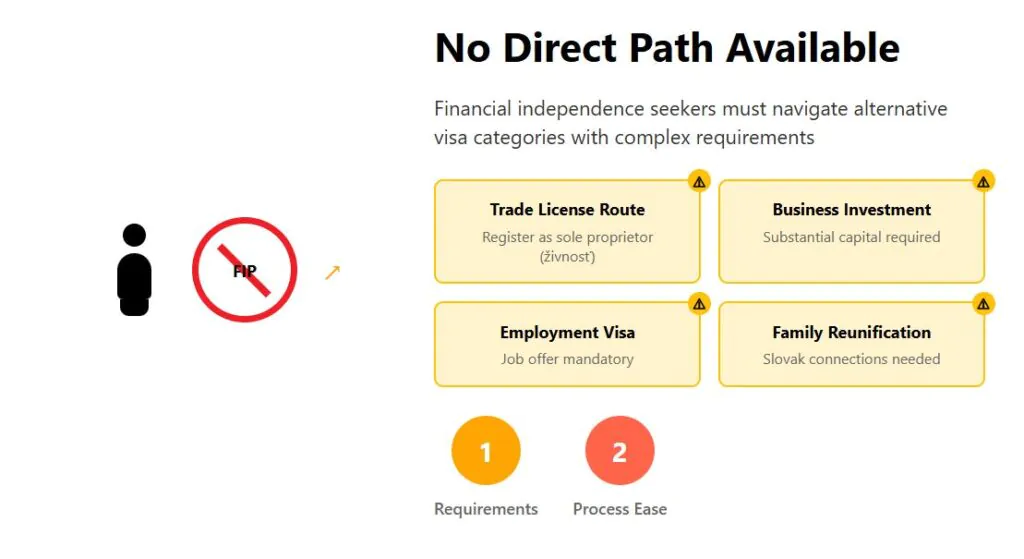
Any attempt would involve other visa types – for example, registering as a sole proprietor (živnosť) and getting a trade license-based residence.
The process is bureaucratic and requires documents in Slovak.
While younger Slovaks speak English, public officers (some working in the same station since communist times) mostly require you to speak Slovak, or bring a translator. Just like Poland, Slovakia gets the same scores.
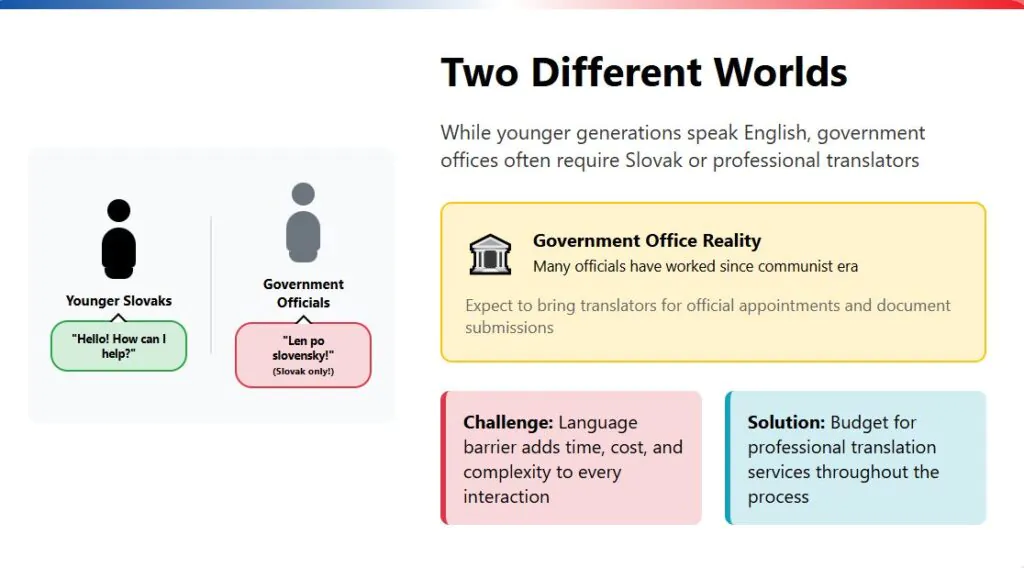
Ratings—Requirements: 1; Process & English-friendliness: 2.
21 – Lithuania
Lithuania’s low living costs and compact cities might appeal to someone looking to stretch a pension, but the residence path for non-EU retirees is far from clear.
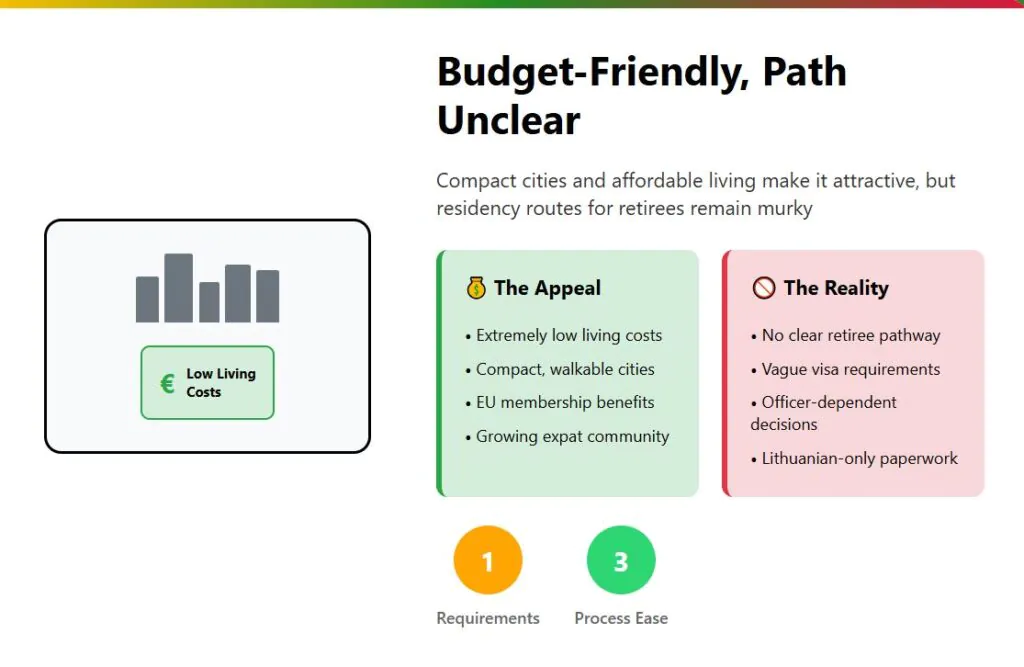
The closest option of a temporary residence permit for a FIP is a one-year National Visa D, but the rules for it are vague.
There is no publicly stated minimum income, and approvals seem to depend on individual officer decisions.
Since there is no dedicated scheme, any application would hinge on proving you have “sufficient financial resources” for your stay and possibly some connection or plan in Lithuania.
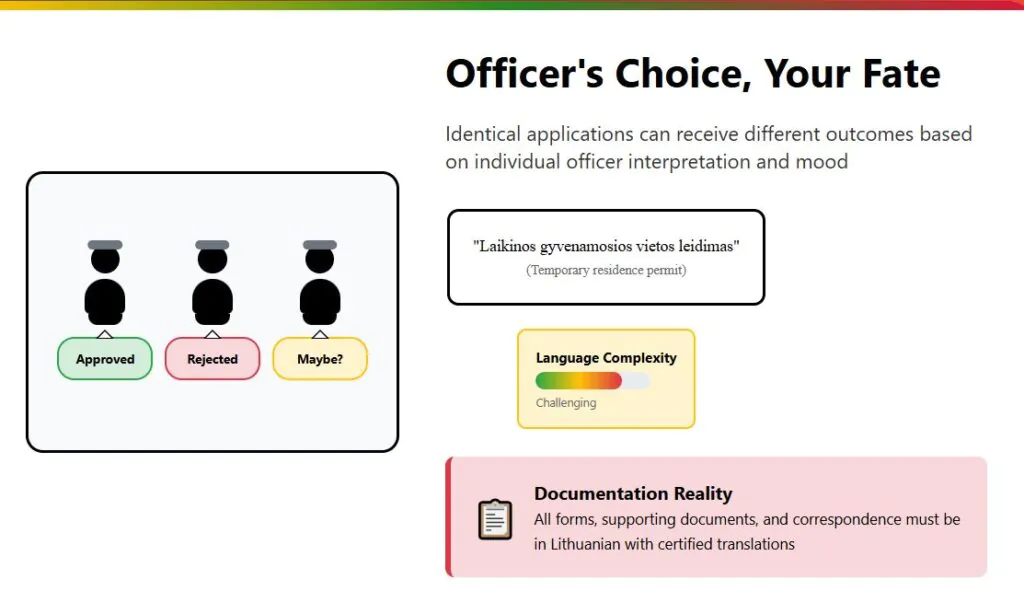
On top of that, all forms and supporting documents must be in Lithuanian, with certified translations.
Ratings—Requirements: 1; Process & English-friendliness: 3.
20 – Slovenia
Slovenia has announced a one-year Digital Nomad Residence Permit to launch in late 2025.
When that happens, you can expect it to rise to much higher positions in this ranking, but…
Since this program isn’t in effect yet, Slovenia is still considered to have no active option for now.
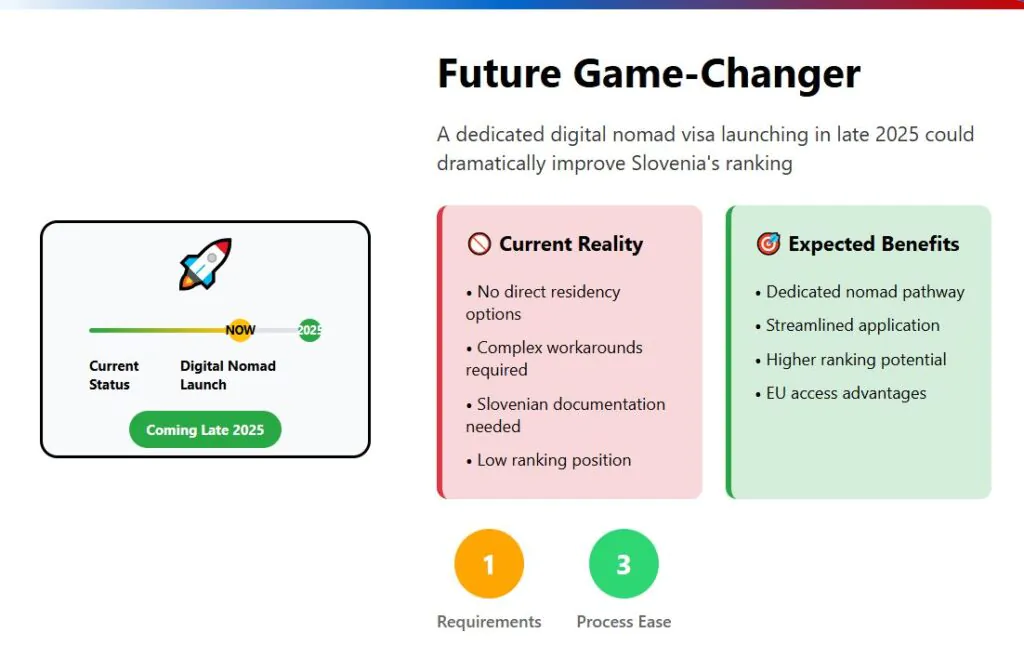
Slovenia’s immigration process historically requires Slovenian-language documentation, and until the nomad visa launches, an independent applicant would have to open a company or enroll in school to gain residency – complicated steps with local language bureaucracy.
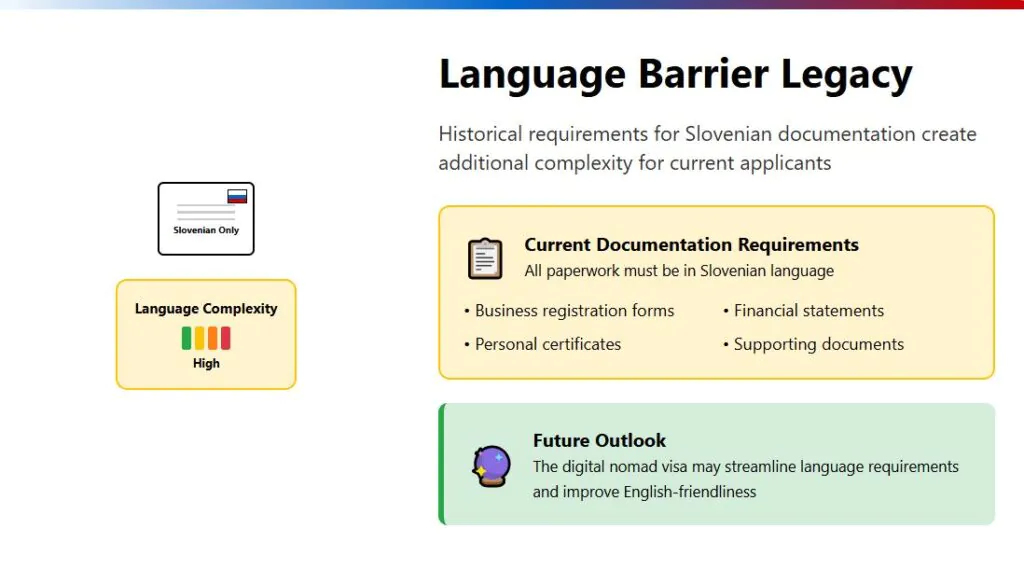
Ratings—Requirements: 1; Process & English-friendliness: 3. It remains low in the ranking until the new visa is active.
19 – The Netherlands
The Netherlands attracts people with its strong economy and English-friendly environment, but if you want to live there without a local job, the options are narrow.
There’s no general retiree or passive income visa available.
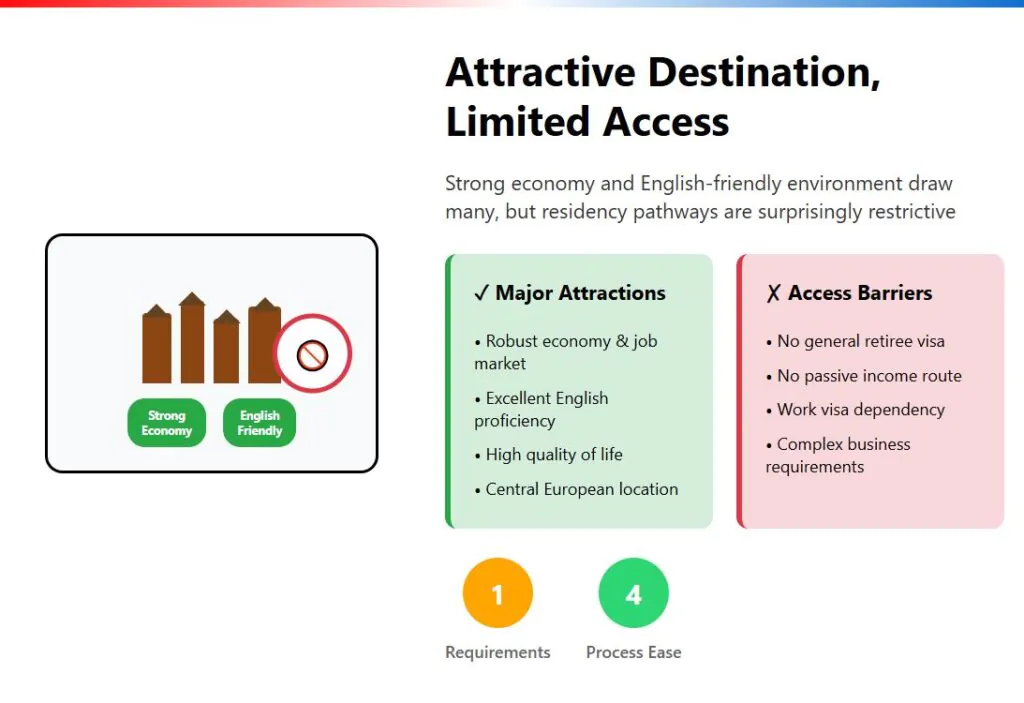
Non-EU citizens typically must qualify via work (including a tough points-based self-employment visa), study, or the Dutch American Friendship Treaty (DAFT) if you are a U.S. citizen.
The DAFT is a special pathway allowing U.S. nationals to start a small business in the Netherlands with a low investment (~€4,500 deposit) and obtain residence, effectively a workaround for some financially independent Americans. But for all other nationalities, the only realistic option is the self-employed permit, which works on a points-based system. You must prove that your business will benefit the Dutch economy, meet experience or education criteria, and provide a detailed business plan.
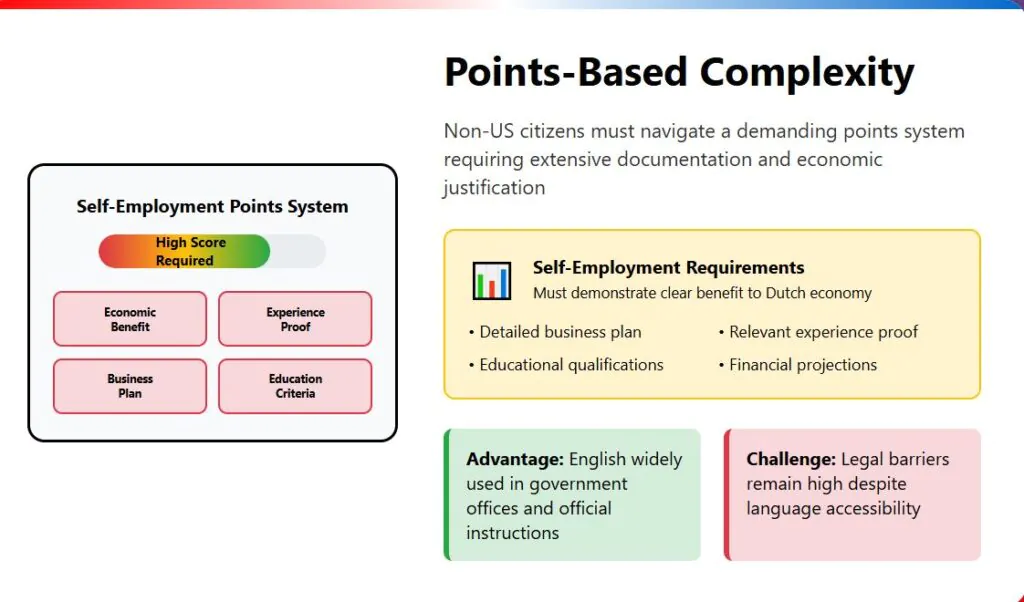
English is widely used in government offices and official instructions, so the process is easier to understand. But the legal barrier remains.
Ratings—Requirements: 1; Process & English-friendliness: 4. It is accessible if you’re American—nearly inaccessible if you’re not.
18 – Germany
Germany does not offer a named “retirement” or passive income visa for non-EU citizens. That said, Germany’s residence law has some flexibility: a person with sufficient means can in theory be granted a residence permit for “private purposes,” but typically one must demonstrate a reason such as long-term ties or humanitarian grounds.
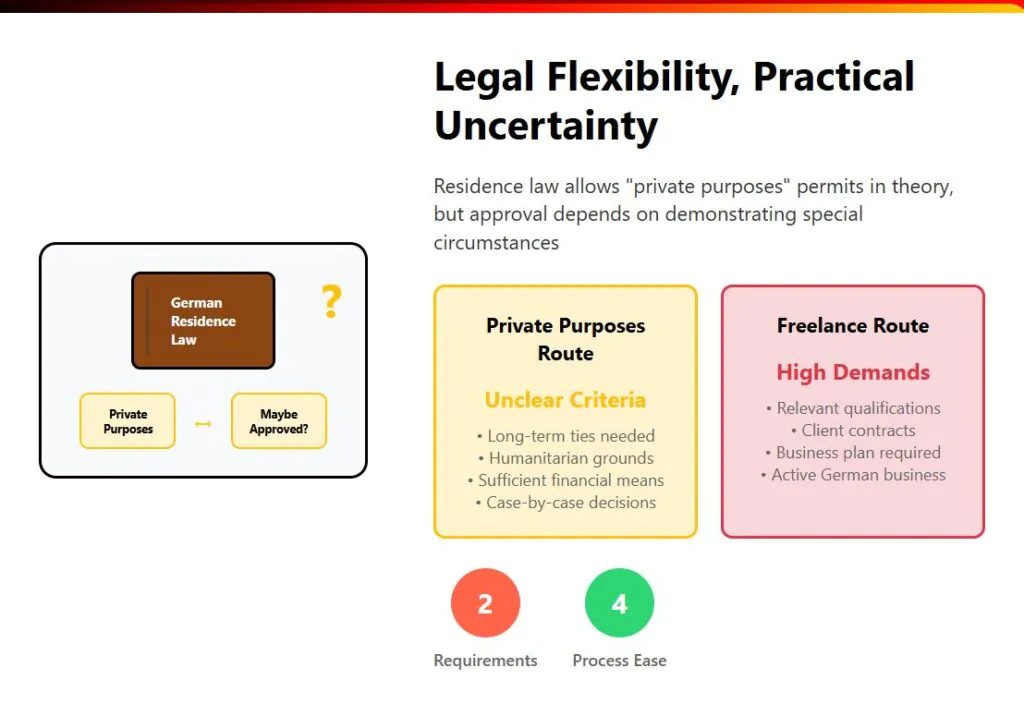
There is also the “Freiberufler” visa, also known as freelance visa.
That freelance route requires more than proof of income – you must show relevant qualifications, possibly client contracts or a viable business plan, and sufficient funds. In major cities like Berlin, successful freelance applicants often need to show income around or above €1,000–€2,000 per month plus savings, and sometimes letters of intent from potential German clients. If you’re purely living on a pension or foreign salary with no German business activity, many local authorities may refuse a freelance visa.
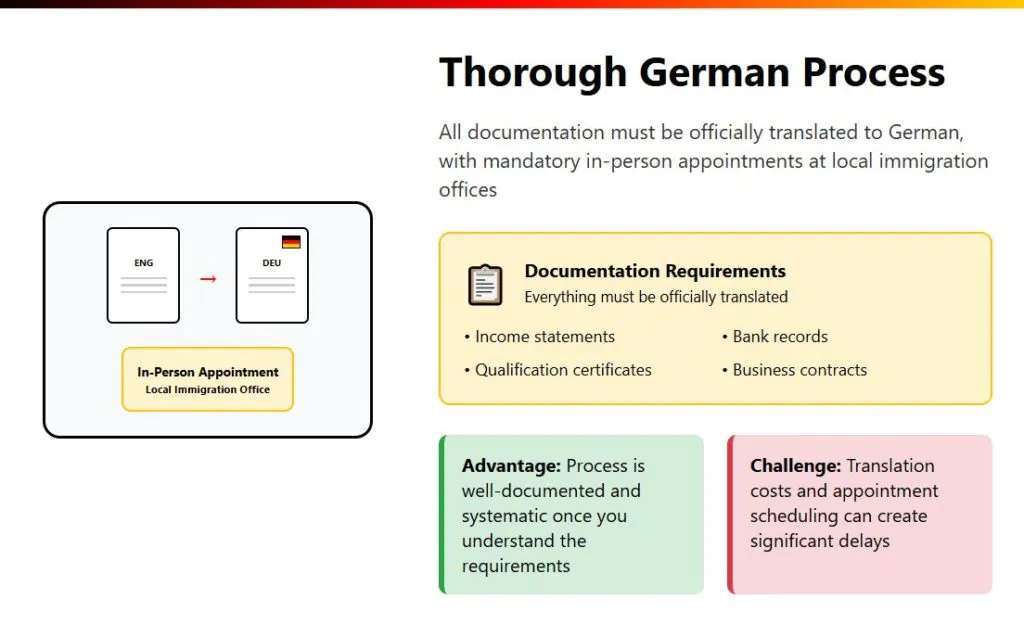
All the paperwork must be in German, official translations are mandatory, and most applications involve in-person appointments at the local immigration office.
Ratings—Requirements: 2; Process & English-friendliness: 4.
17 – The Czech Republic
In the Czech Republic, there’s no formal retiree or remote worker visa, but there is a known workaround: non-EU nationals can apply for a Long-Term Visa for the Purpose of “Business” by obtaining a Czech trade license (Živnostenský list). This essentially means registering as self-employed in Czechia. Many digital nomads and early retirees have used this route to live in Prague – it’s not a retirement visa per se, but it has functioned as a de facto “nomad visa” for some.
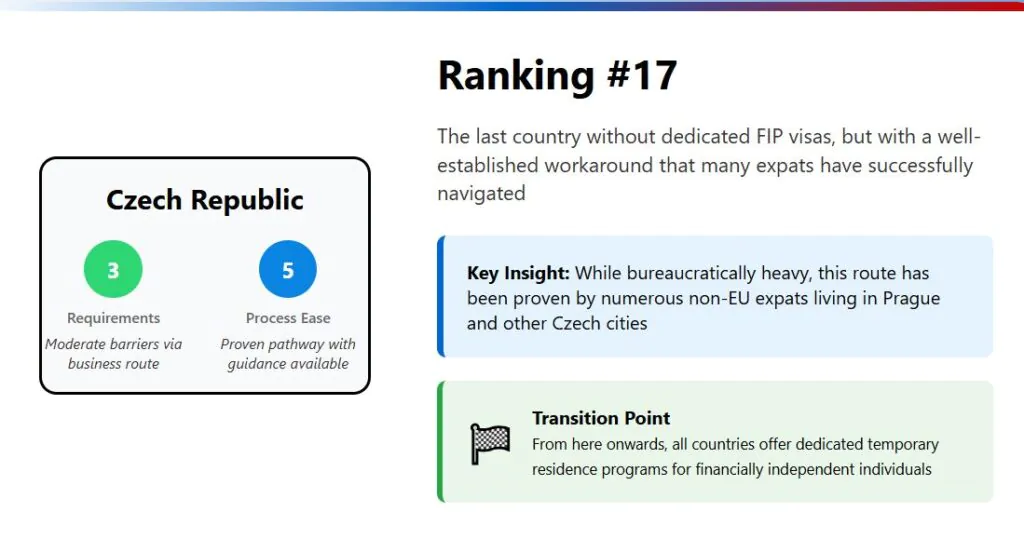
Authorities have become stricter about making sure the business exists and operates. Applicants are often asked for contracts, invoices, or client agreements to prove genuine activity. Those without a clear business plan or evidence of work risk having their applications refused.
All documentation must be submitted in Czech, and certified translations are required for anything in another language. The application process involves multiple offices—trade licensing, foreign police, and immigration—each with its own set of forms and timelines.
This system makes the route possible but bureaucratically heavy, especially for someone without local language skills or business activity.
Ratings—Requirements: 3; Process & English-friendliness: 5.
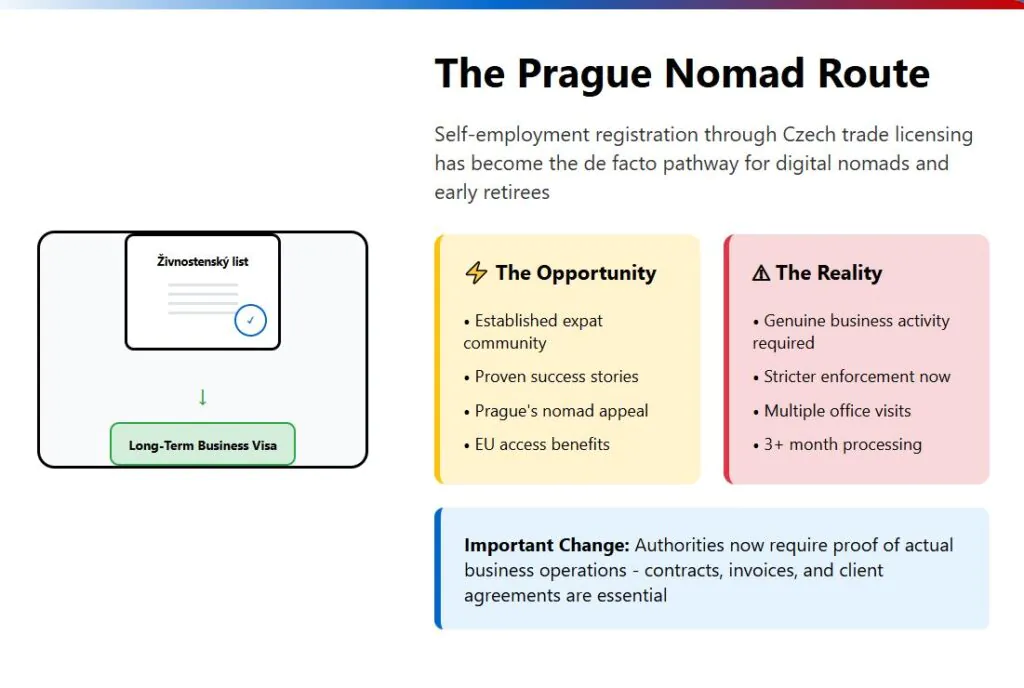
The Czech score is higher than the previous countries because numerous non-EU expats have, in fact, navigated it, meaning it’s doable with guidance. Still, without Czech language support it’s hard, and processing can take 3+ months.
The Czech Republic is the last country in our list that do not have a temporary residence visa program for FIPs (financially independent individuals (retirees, persons of independent means, and/or digital nomads). From now on, the next countries all have a dedicated temporary residence visa or permit category for FIPs.
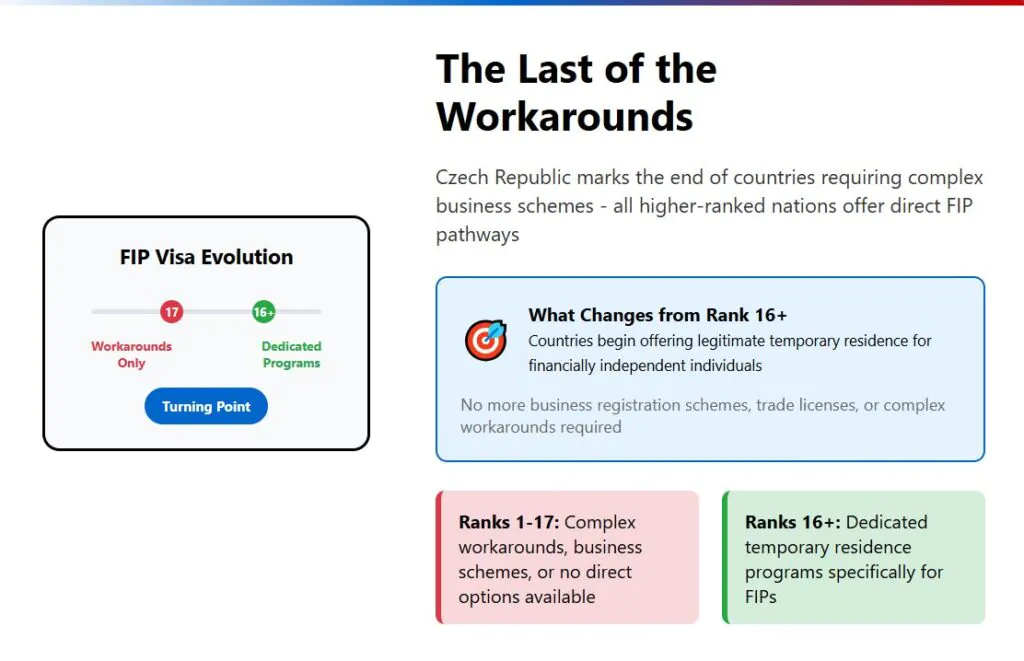
16 – Ireland
For English speakers, Ireland might look like one of the easier EU countries to move to because there’s no language barrier.
But for financially independent people, the main route is through what’s called Stamp 0.

This is permission to reside if you can fully support yourself without access to public funds. The catch is the income threshold: at least €50,000 a year per person, plus enough savings to cover unexpected costs. That is why among the 16 countries that do have a temporary residence visa for FIPs, Ireland ranks the lowest – it is the most expensive.
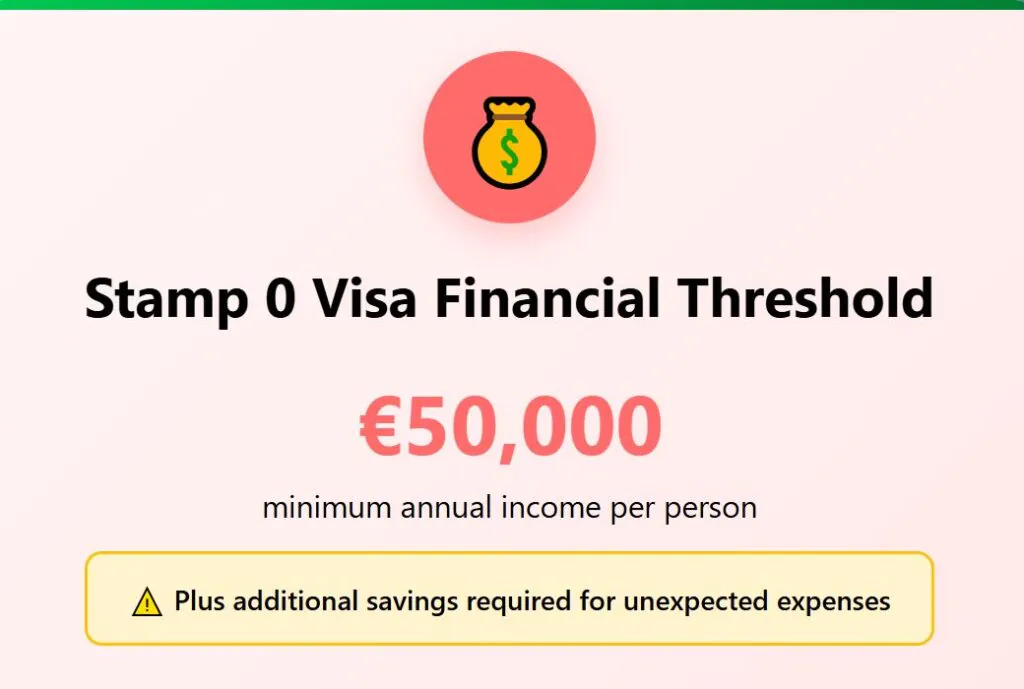
You also need private medical insurance that matches Irish requirements, and the application can take several months from submission to approval.
The process is clear and handled entirely in English, which removes the translation burden many other countries have.
Still, the financial requirement rules out many applicants, even those who could live comfortably in Ireland on less. Overall, the high cost places Ireland in the middle of the table.
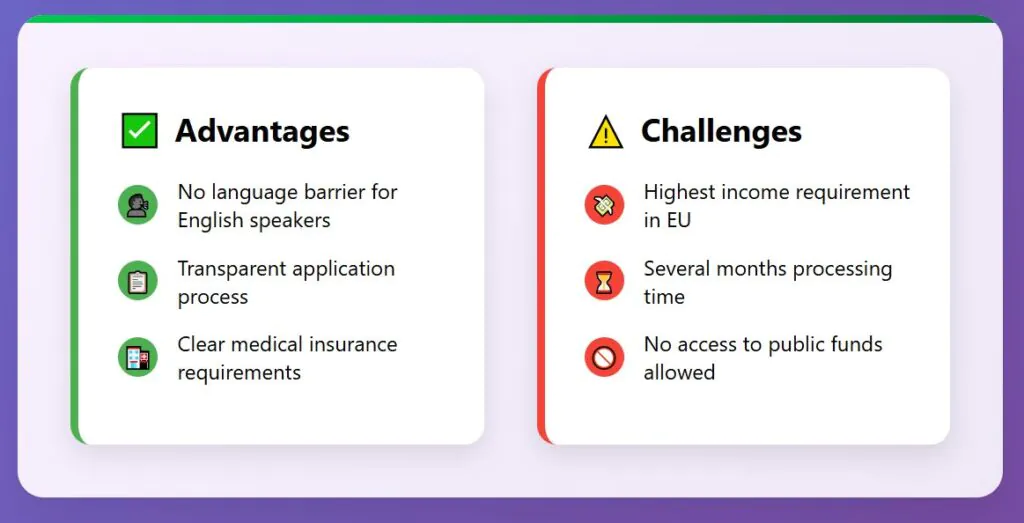
Ratings—Requirements: 2; Process & English-friendliness: 6.
15 – Austria
Austria has a very clear residence permit for financially independent persons. On the surface, that makes it sound open and straightforward.
But the program has a strict annual quota—only a limited number of slots per year, per province, are available for these non-working resident permits, so timing is critical.
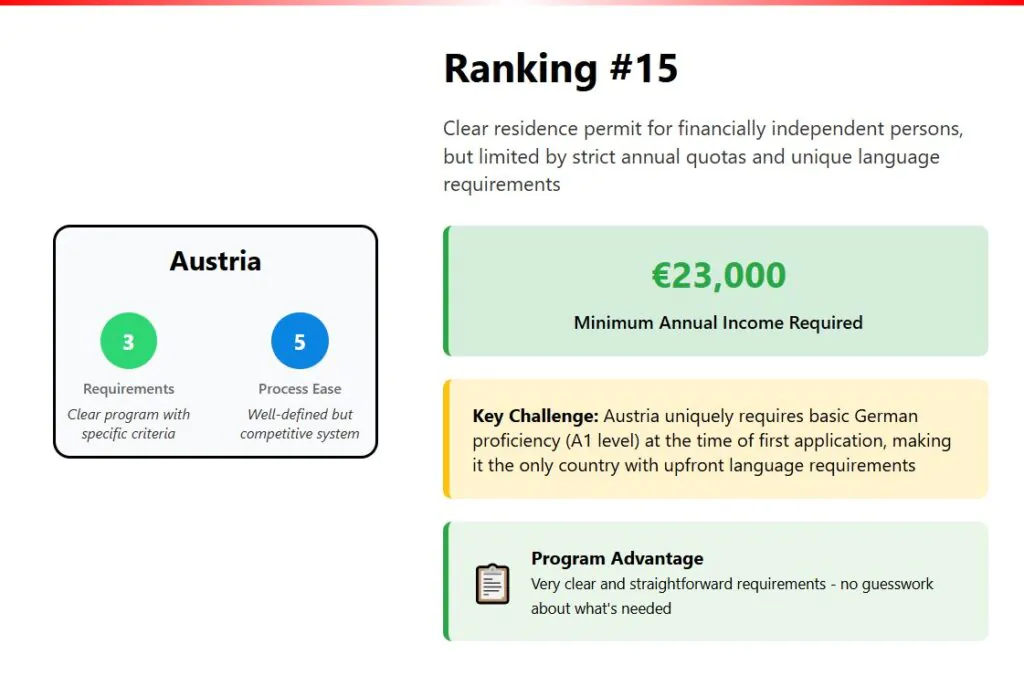
To qualify, you must show a minimum income of about €23,000 per year for a single applicant, proof of accommodation in Austria, and private health insurance that covers the full range of services.
On top of this, and very uniquely, Austria also requires applicants to prove basic proficiency in German (A1 level) at the time of first application, unless exempt by age or other factors. A1 German is a beginner level, but still it means you’ll need to take lessons and obtain a certificate before applying.
If you are planning to learn a new language, the secret weapon I recommend to all my clients is Lingq – it is the tool I used to learn of the hardest languages in Europe.
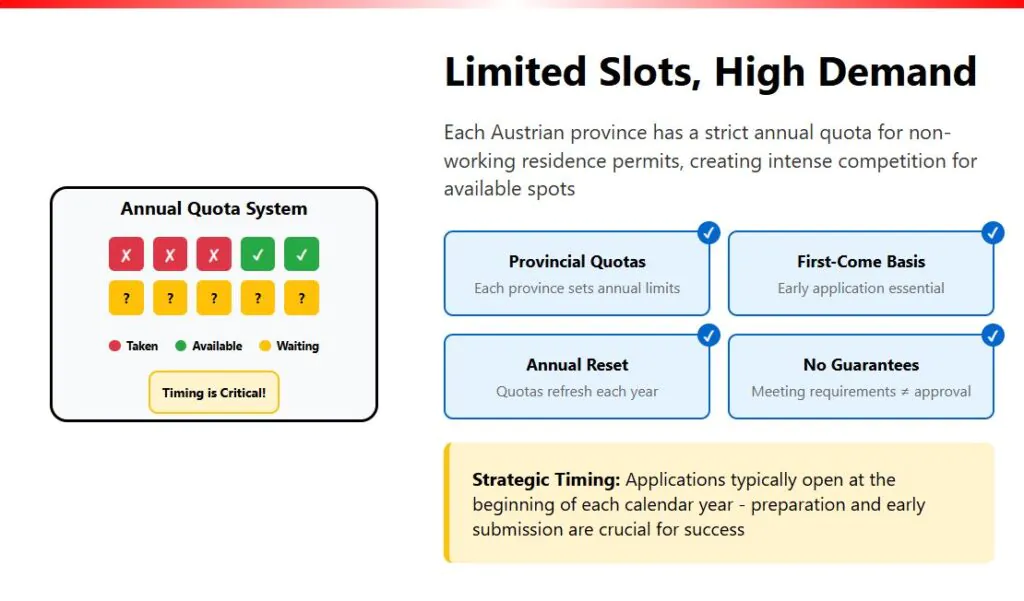
Applications must be submitted in person, and all foreign documents need certified translations into German.
While the process is clearly defined, it is also competitive and documentation-heavy. Clear rules, but high demand and added language barriers.
Ratings—Requirements: 3; Process & English-friendliness: 5.
14 – Italy
Italy’s Elective Residence Visa is one of the most recognized residence routes in Europe for non-EU retirees and individuals living off passive income.
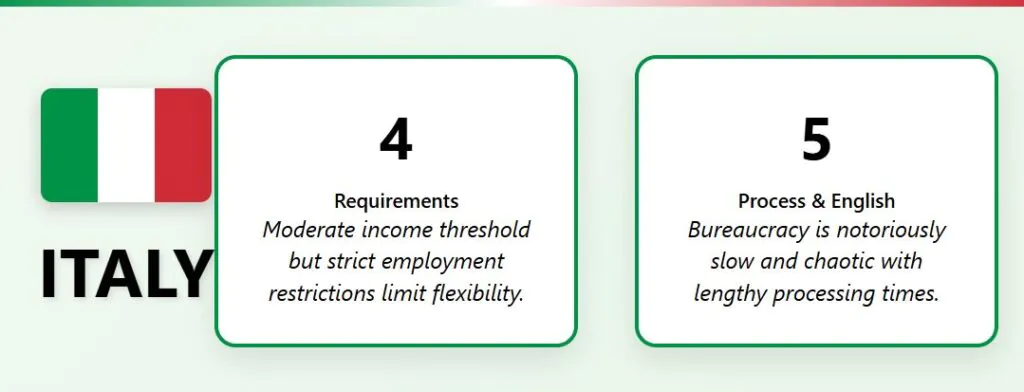
It’s designed specifically for those who can support themselves without working in Italy, but the financial requirement is steep—around €31,000 per year for a single applicant. If a spouse is joining, typically the required income increases by about 20% (so roughly €37,200/year for a couple), and more for additional family members. The rules also explicitly forbid any local employment or self-employment, so your income must come from abroad.
Applicants face a detailed process that involves gathering proof of steady income, bank statements, accommodation arrangements for at least a year, and comprehensive private health insurance. All documents must be in Italian or officially translated, and you’ll need to apply through the Italian consulate in your home country.
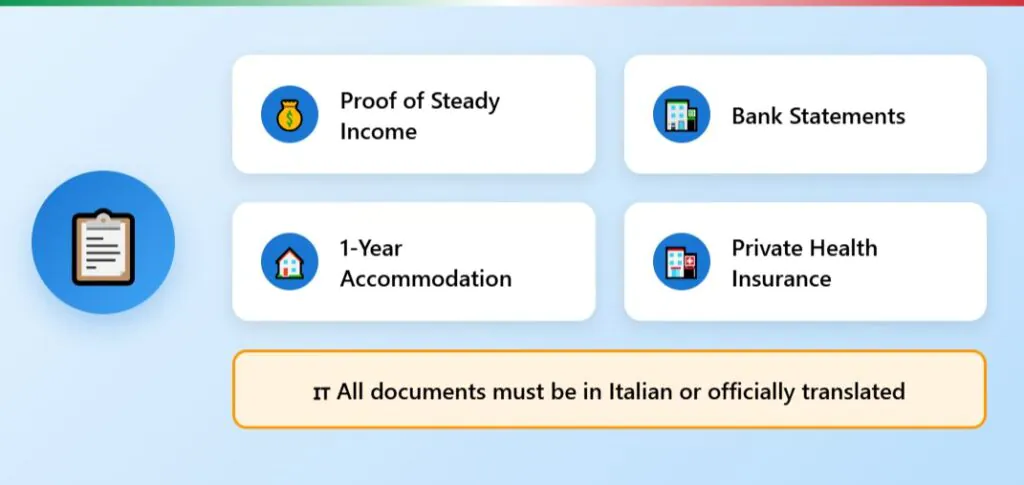
It’s a route that works well for those who have the income and aren’t in a rush—but it demands patience, preparation, and a budget that comfortably exceeds the minimum requirement.
Ratings—Requirements: 4; Process & English-friendliness: 5. Italy’s bureaucracy is known to be slow and a bit chaotic; getting the initial permesso card can take another 1–2 months or more.
13 – Estonia
Estonia was one of the first EU countries to officially introduce a Digital Nomad Visa, putting a legal framework around what many remote workers were already doing. The permit allows you to live in Estonia for up to one year while earning your income from clients or employers outside the country.

The biggest limitation is the income threshold. You must show a monthly income of about €4,500 before tax, for the six months prior to applying. This figure is far higher than local living costs and automatically excludes many otherwise suitable candidates.
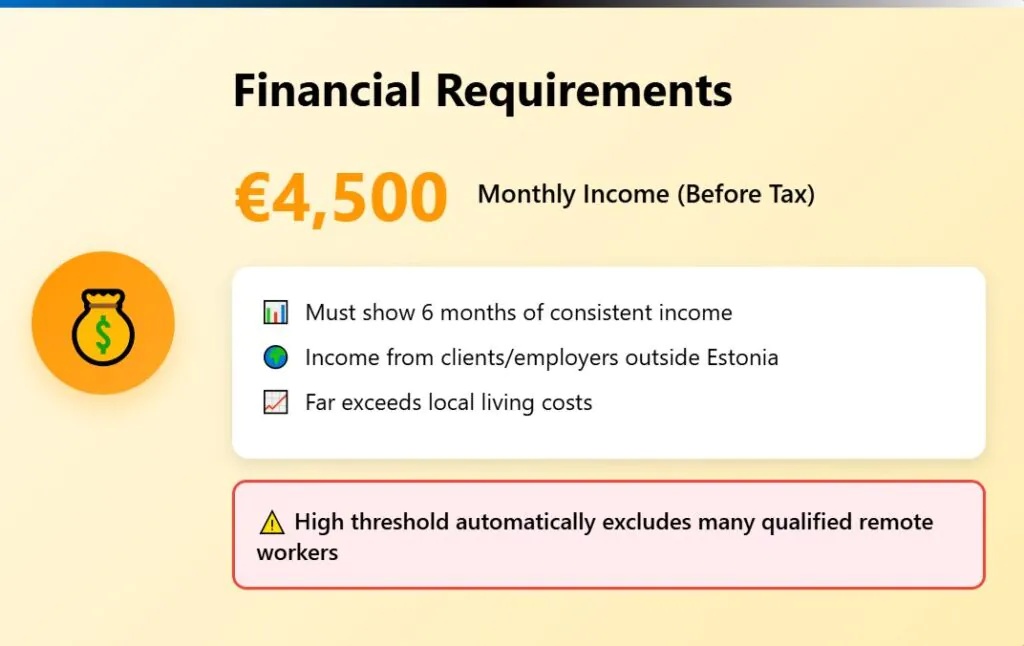
The application process is straightforward, with online forms and clear instructions available in English. You submit your materials digitally, then attend a short appointment at an embassy or in Estonia. For those who qualify financially, administrative friction is low.
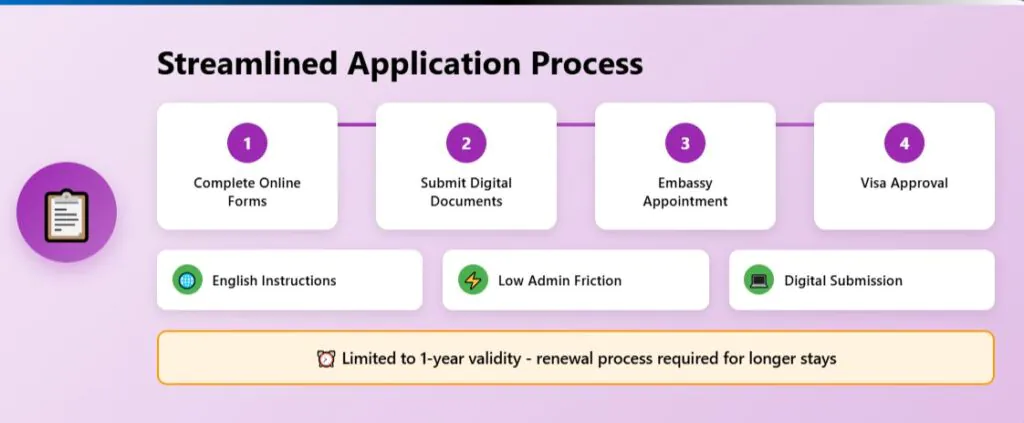
Ratings—Requirements: 3; Process & English-friendliness: 7. The short validity period keeps it from ranking higher.
12 – Romania
Romania’s Digital Nomad Visa, introduced in 2022, gives remote workers a legal way to live in the country while earning income from abroad. It’s not the cheapest in terms of financial requirements—you must show a pre-tax monthly income of about €3,700, along with proof that you’ve worked remotely for at least 12 months before applying. This makes it accessible to mid-to-high earners, but out of reach for many freelancers or early retirees.
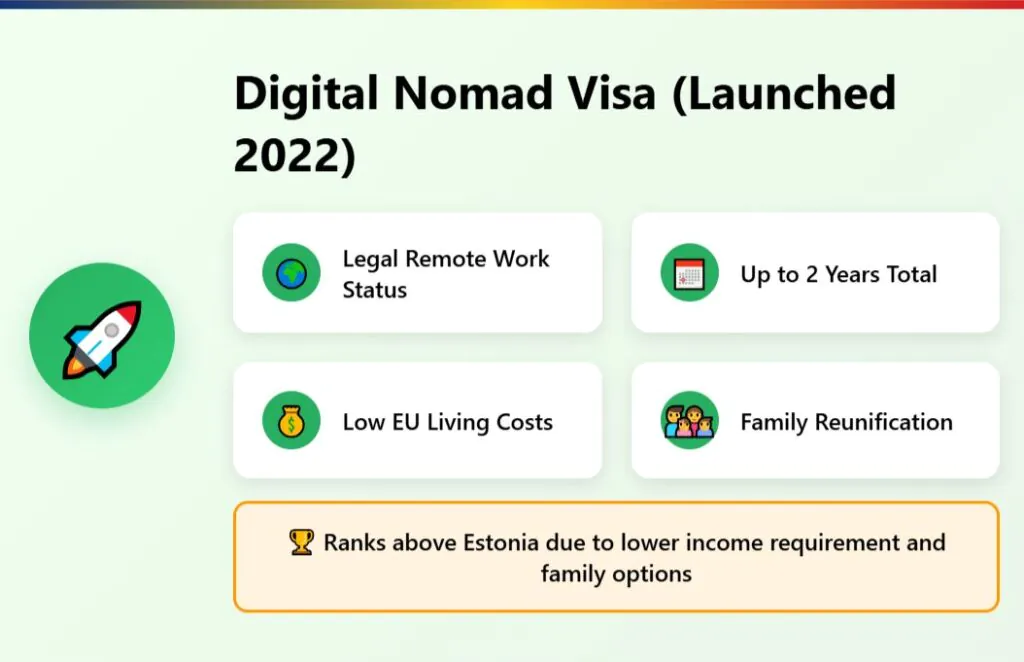
The process itself is more traditional than in some countries. Most documents need to be in Romanian, so certified translations are unavoidable, from proof of income to insurance policies. That extra step adds cost and time, although some local authorities have been improving guidance and process clarity.
Approved stays run up to one year, with the option to renew for a second, giving more stability than short-term stays.
Ratings—Requirements: 5; Process & English-friendliness: 5.
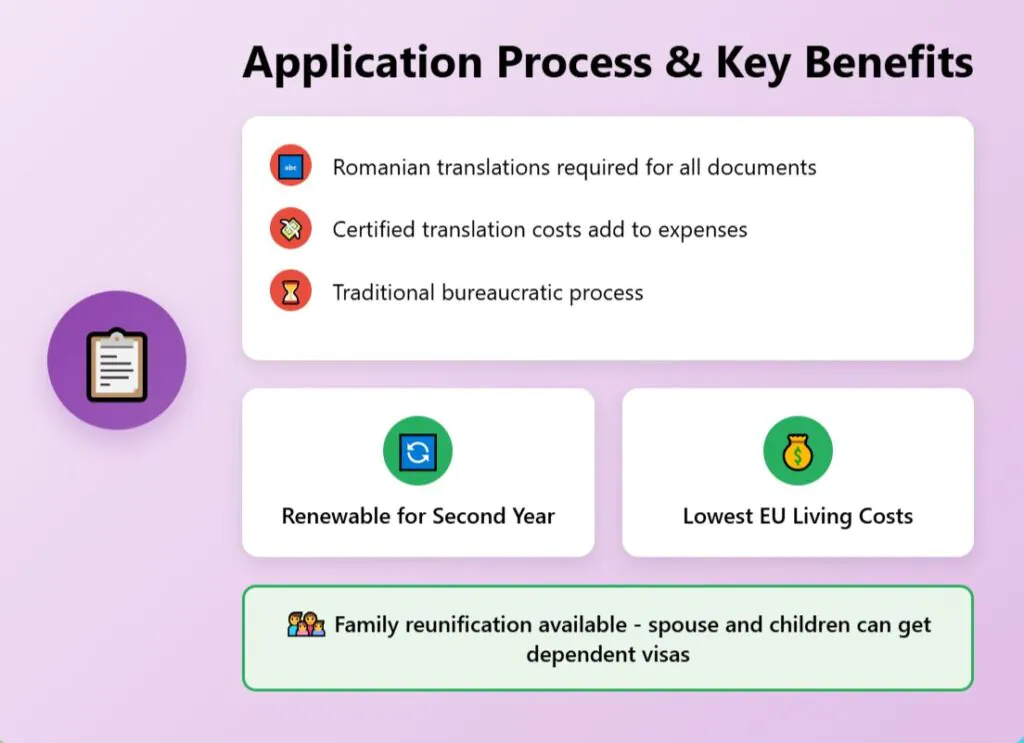
We rank Romania just above Estonia because the income requirement (€3,700) is a tad lower, and Romania’s cost of living is one of the lowest in the EU (so your money goes further, though that’s not a direct factor in visa obtention).
Additionally, Romania now allows family reunification for nomad visa holders – a plus if you have a spouse or kids (they can get visas too as dependents).
11 – Latvia
Latvia has a straightforward route for certain retirees.
If you are 65 or older, you can apply for a temporary residence permit with proof of a pension of just €684 per month. That’s one of the lowest income thresholds in the EU for a legal long-term stay, and it’s valid for a year at a time with the option to renew.
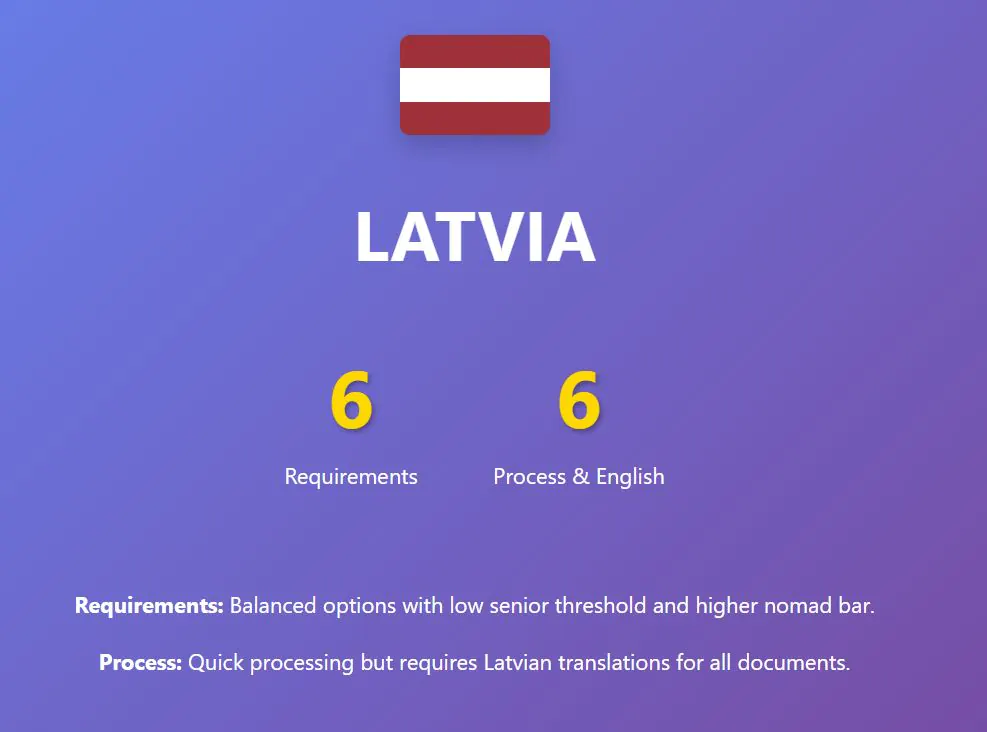
For others, there’s also the digital nomad visa, but the requirement there is far higher—about €2,500 per month earned from work outside Latvia.
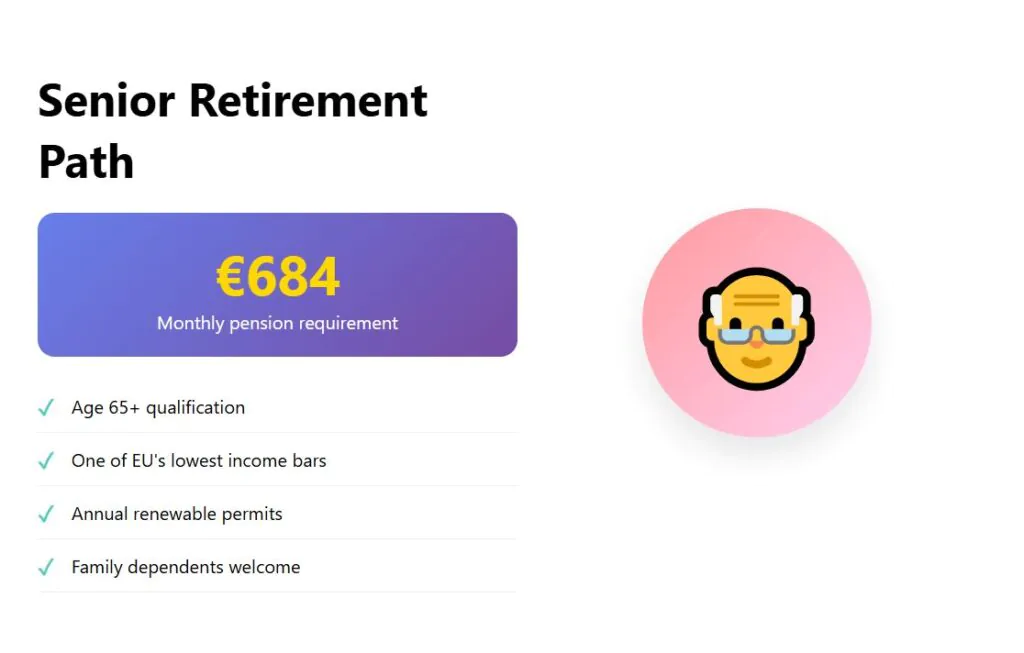
Processing times are relatively short compared to other countries, which makes planning easier. The trade-off is the paperwork. Applications and supporting materials are handled in Latvian, so certified translations will be necessary for foreign documents, from bank statements to insurance certificates.
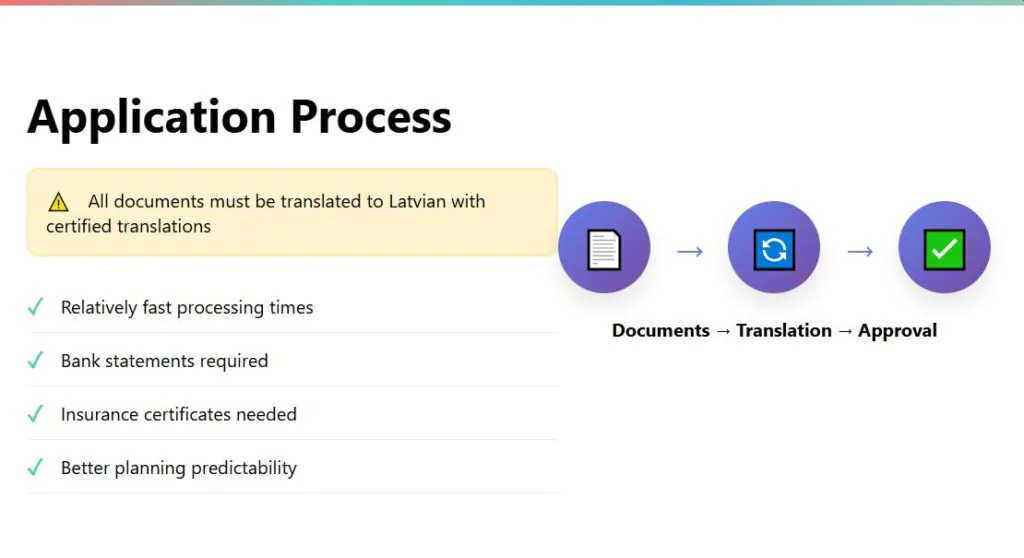
This mix of low-bar retirement access for seniors, plus a higher-bar modern nomad visa, gives Latvia a degree of choice that many countries lack. Ratings—Requirements: 6; Process & English-friendliness: 6.
Now we will enter the TOP 10 – the easiest countries to obtain a temporary residence visa in Europe.
But before, I have some really good news: FREE FOR A LIMITED TIME: Grab your Expat Wealth & Lifestyle Compass ($108 value) today! Includes our 74-page guide of Affordable European Cities, our Zero-Tax countries report, and our expat checklist. https://bit.ly/ExpatWealthLifestyleCompass Join us here before this offer ends.
10 – Hungary
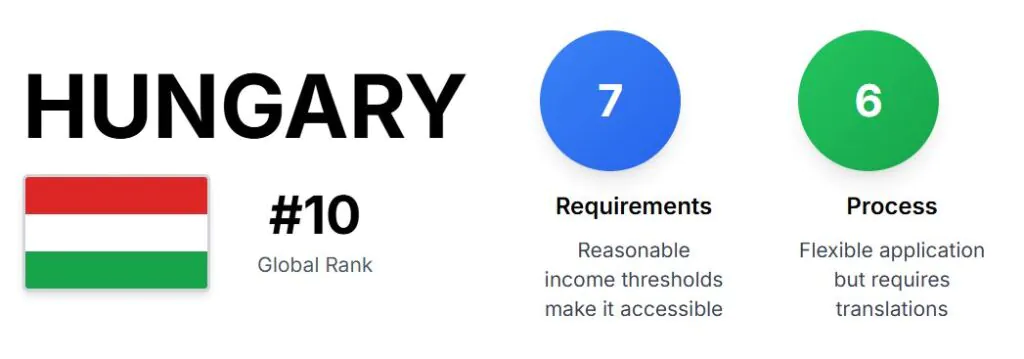
Hungary’s “White Card” residence permit is aimed directly at remote workers who earn their living from outside the country.
It covers freelancers, employees of foreign companies, and business owners whose clients are abroad. The income requirement falls between €2,000 and €3,000 per month, depending on how long you have had that source of income. You’ll need to show bank statements and often contracts to confirm the work arrangement.
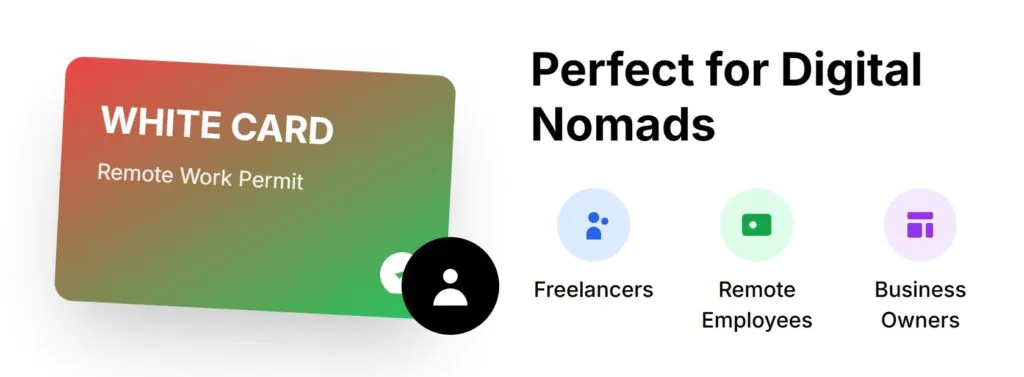
One advantage is flexibility in where you apply. If you’re already in Hungary on a short-term visa or visa-free stay, you can submit your White Card application from inside the country. That means no need to return home for a consulate appointment. That saves time, but you still have to prepare translations—key documents like contracts, bank records, and insurance policies must be in Hungarian.

The permit is issued for one year and can be renewed, making it practical for medium-term plans. With moderate income requirements and an in-country application option, Hungary ranks in the top 10. It scores 7 in “Requirements” because of the reasonable financial bar and 6 in “Process & English-friendliness” for its flexibility and ability to apply in-country, minus points for the translation requirements and typical Hungarian bureaucracy.
9 – Luxembourg
Luxembourg offers a residence option for financially independent people, but it comes with one of the highest income thresholds in the EU—about €2,313 per month after tax. And this threshold is based on the local minimum wage, which means it might increase year after year.
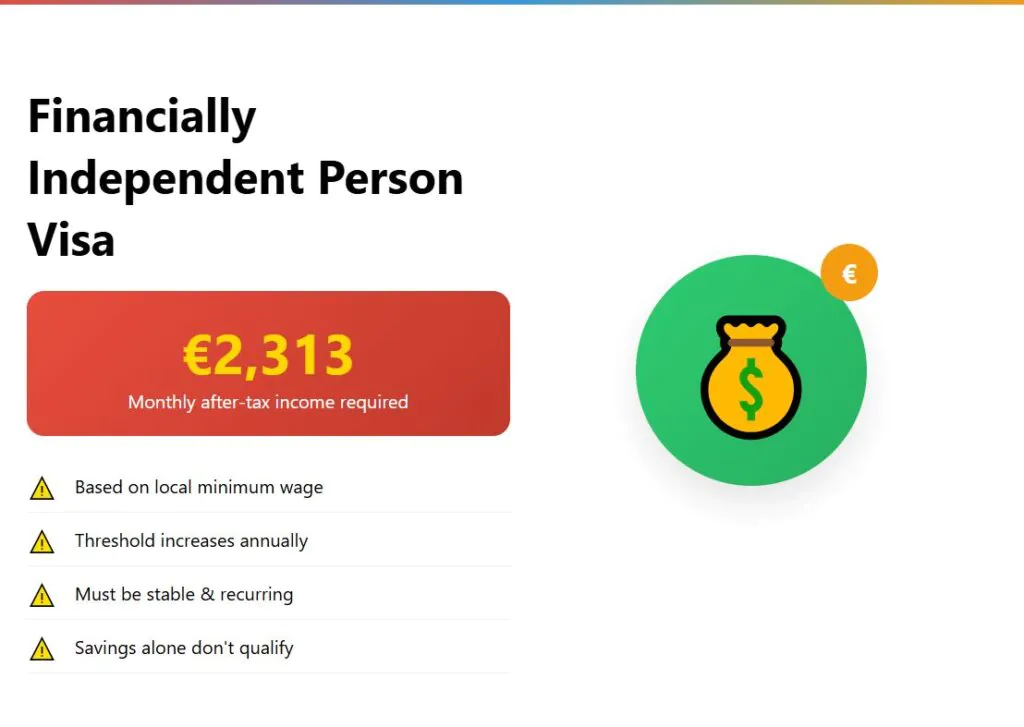
You must prove this income is stable and recurring, not just from savings. On top of that, you’ll need to secure a local address before applying, which can be a challenge given the country’s small housing market and high rental costs.
Most official documents must be translated into French, German, or Luxembourgish, and while basic guidance can be found in English, the actual process often requires dealing with offices where English is limited.
What sets Luxembourg apart is the long-term reward: after just five years of continuous residence, you become eligible to apply for citizenship—one of the fastest timelines in Europe– though language requirements for citizenship are another story.
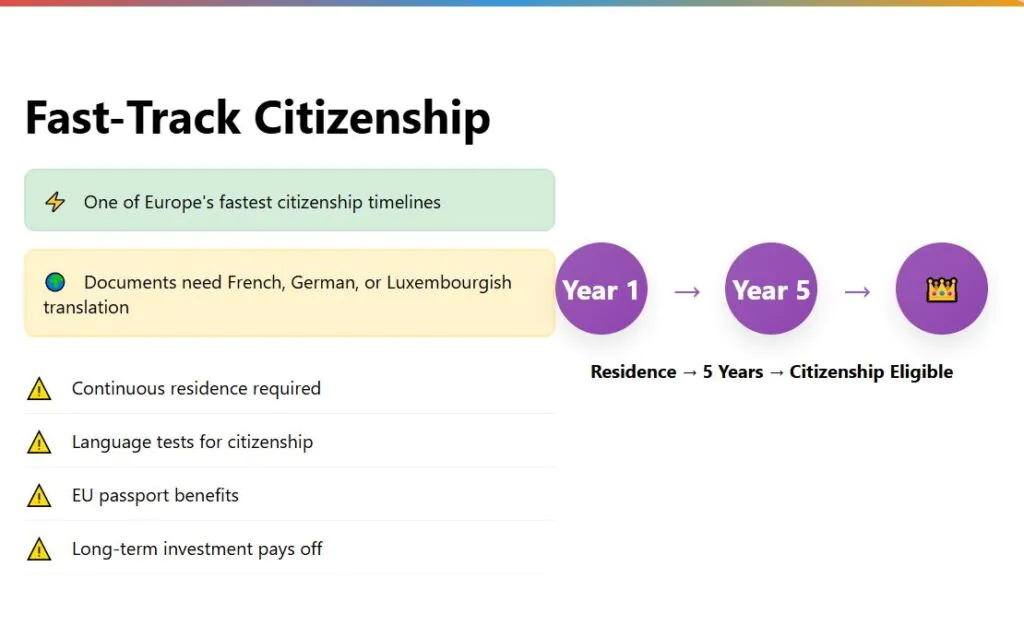
Luxembourg scores 7 in “Requirements” for the high but clear income bar, and 6 in “Process & English-friendliness” because the process has language barriers despite being relatively well-structured.
8 – Croatia
Croatia now allows digital nomads to apply for a residence permit that lasts up to three years. That’s far longer than many other EU countries, and it removes the stress of yearly renewals. For anyone earning their income online, it’s an opportunity to stay in one place without the constant cycle of paperwork.
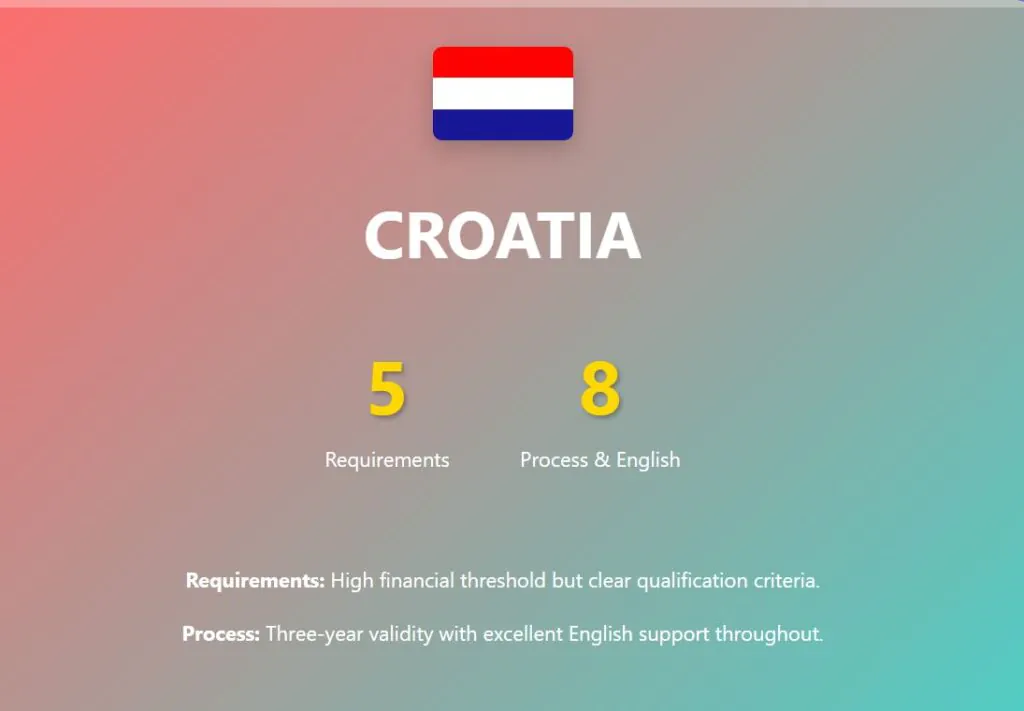
To qualify, you need to show proof of at least €3,295 per month in income or equivalent savings that meet that figure over the required period—yes, quite a high threshold, but there are other advantages which I will reveal soon.
The income must come from outside Croatia, and you’ll need to provide documents confirming your remote work arrangement, such as contracts or business registration. Health insurance covering your entire stay is mandatory and must be valid in Croatia.
English is widely spoken, particularly within official processes related to the program, which makes applications much easier for most foreigners.
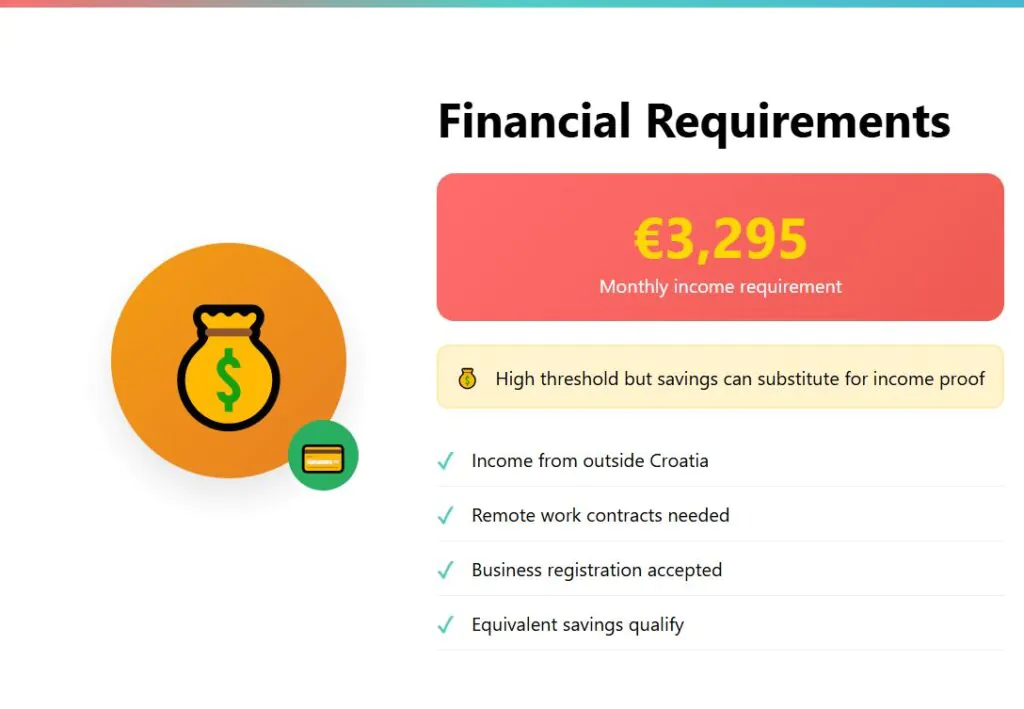
Croatia scores 5 in “Requirements”, losing points for the high financial bar, but earns 8 in “Process & English-friendliness” since the visa is valid for three years and has minimal language barriers.
7 – Spain
Spain draws a huge number of expats and remote workers every year, thanks to its mix of modern infrastructure, reliable healthcare, and a relatively low cost of living compared to much of Western Europe. For non-EU citizens who are financially self-sufficient or working remotely, there are two main visa routes.
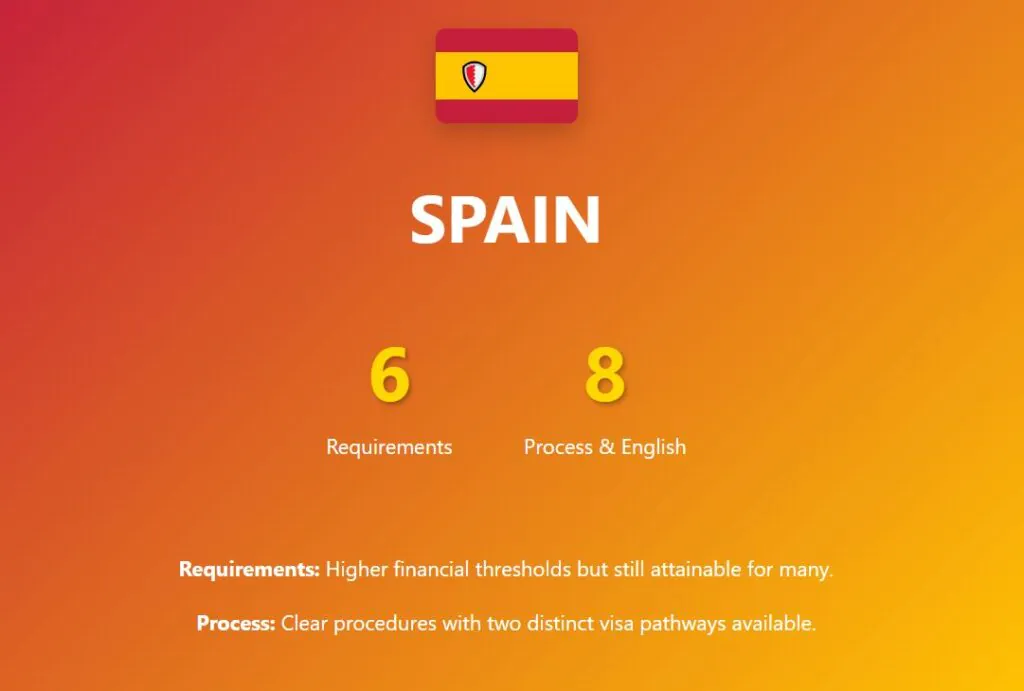
The first is the Non-Lucrative Visa, aimed at retirees or those living off passive income. You must show at least €25,800 per year for one person, hold private health insurance, have no criminal record, agree to not perform any paid work in Spain, and spend more than six months a year in the country.
The second is the Digital Nomad Visa, for those actively working online. It requires around €28,000 per year in income, proof of remote work, at least three years of experience or relevant qualifications, health insurance, police clearance, and permits up to 20% of your income to come from Spanish clients.
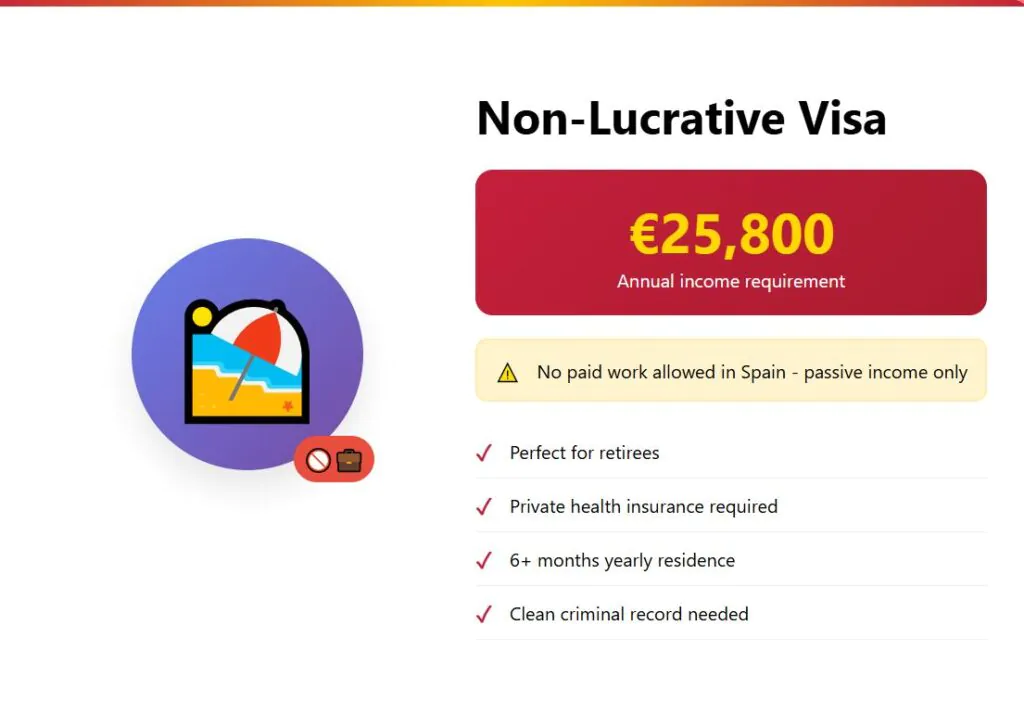
While the NLV suits those not planning to work, the DNV is tailored for active remote workers and allows limited Spanish income. Both have higher income thresholds than options in Portugal or Greece but are still attainable for many. Applications go through a consulate—DNV can also be done in Spain—with a 1–2 month wait.
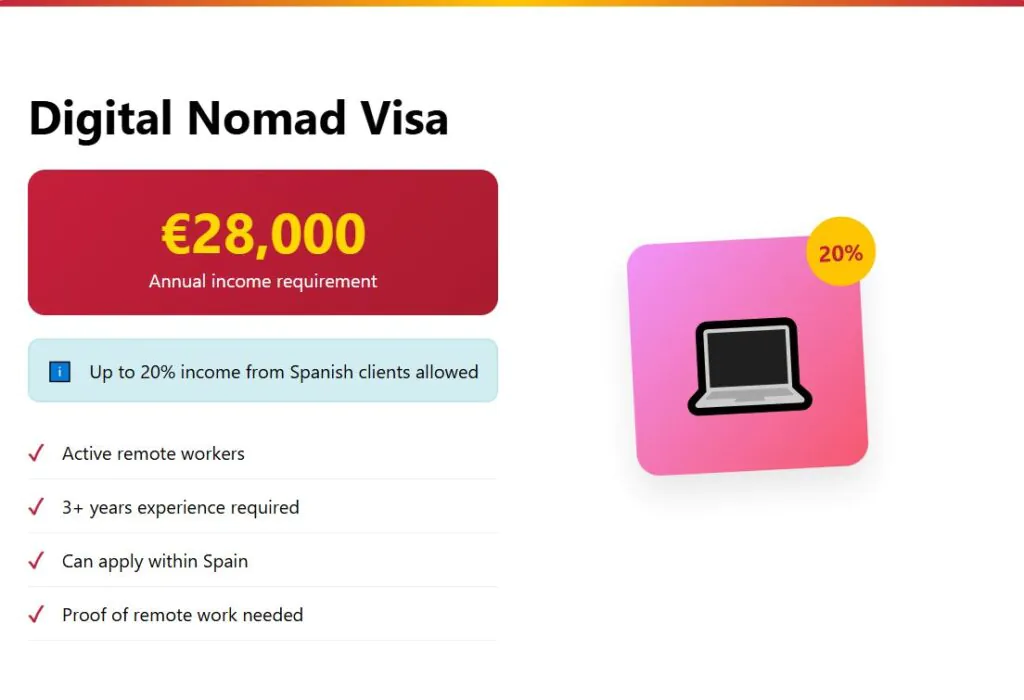
Spain scores 6 in “Requirements” for its higher financial bar, and 8 in “Process & English-friendliness” for clear procedures and having two distinct visa options.
6 – Malta
Malta is one of the few EU countries where English is an official language, making it easier for many foreigners to manage daily life and administration. It offers sunny weather, a stable environment, and two main residency routes for non-EU citizens who are financially independent.
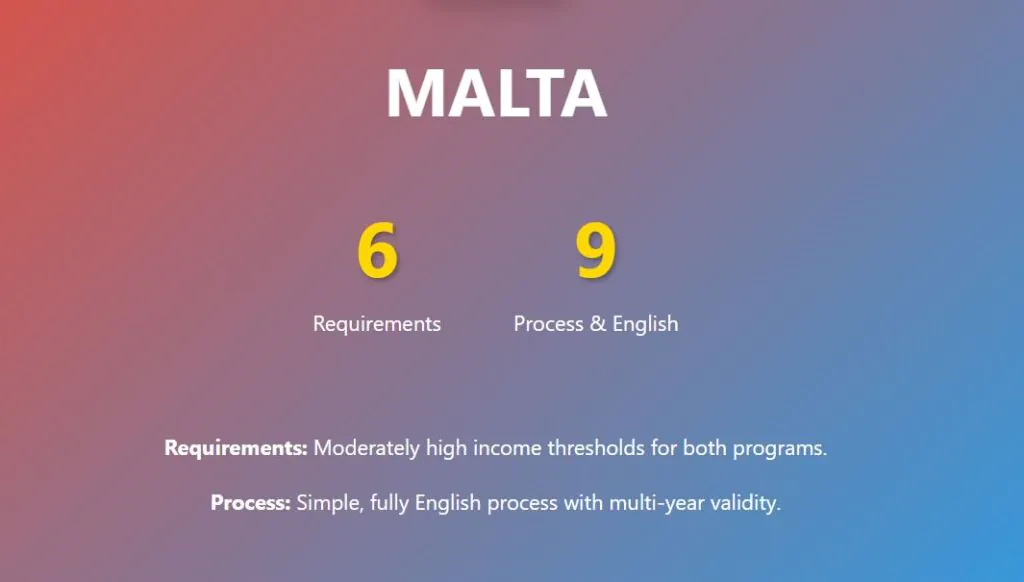
The first is the Nomad Residence Permit (NRP), created for remote workers. Applicants must earn at least €2,700 gross per month from work outside Malta. The application requires a small set of documents—proof of income, proof of employment or business ownership, and health insurance. Family members can be included. The process is done entirely online, with most approvals taking two to four weeks.
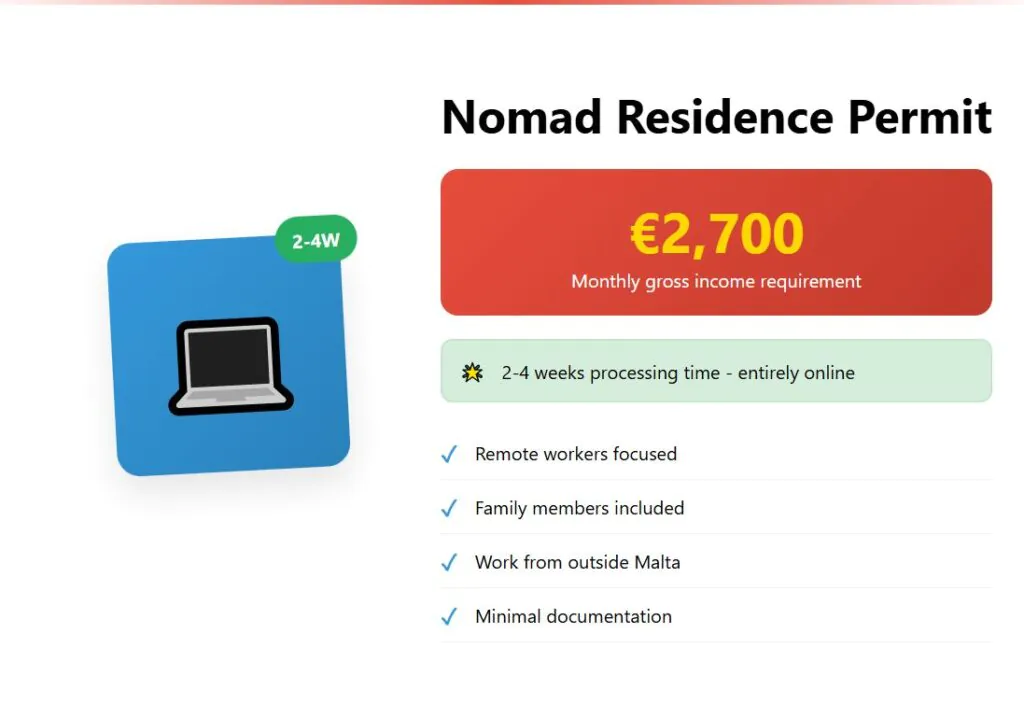
The second is the Global Residence Program (GRP), aimed at retirees and high-net-worth individuals looking for a more permanent base. It requires purchasing or renting property above a certain value, paying a €15,000 annual flat tax, and having passive income from abroad.
The NRP is a flexible short-to-mid-term option, while the GRP suits established retirees or investors. Both benefit from Malta’s English-speaking officials, no translation needed, and online submissions. The toughest part is finding suitable housing in a tight and expensive rental market.
Malta scores 6 in “Requirements” due to moderately high income thresholds, and 9 in “Process & English-friendliness” for its simple, fully English process and multi-year visa validity.
5 – Cyprus
Cyprus offers a warm climate, relaxed pace, and the advantage of English being widely used in daily life and government offices. For non-EU citizens who are financially self-sufficient, there are two main residency routes.
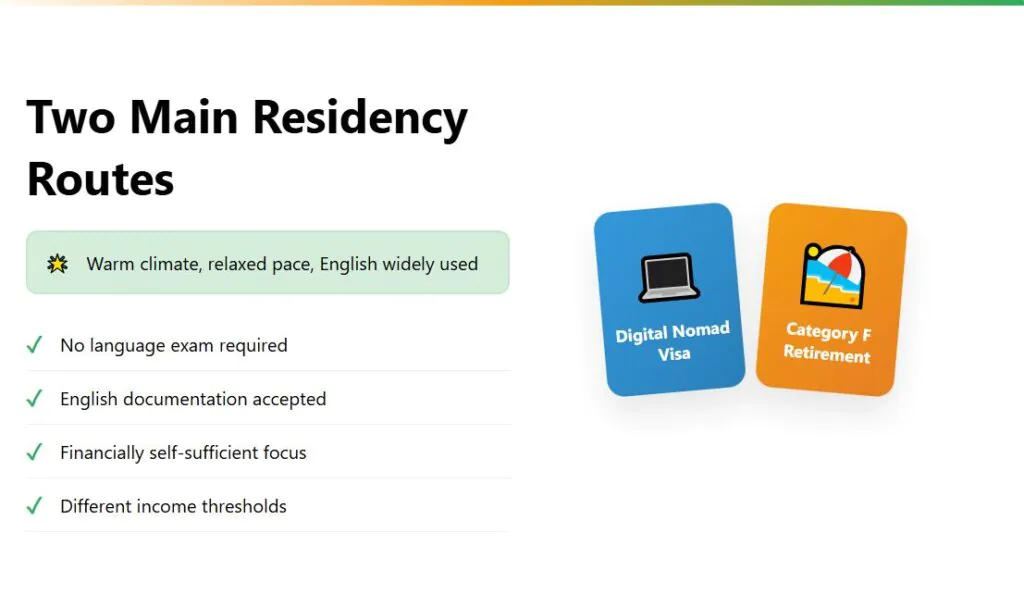
The first is the Digital Nomad Visa, for remote workers earning from outside Cyprus. You’ll need a net income of at least €3,500 per month, with the threshold increasing if you bring family. You can’t work for Cypriot clients. Health insurance and a clean police record are required.
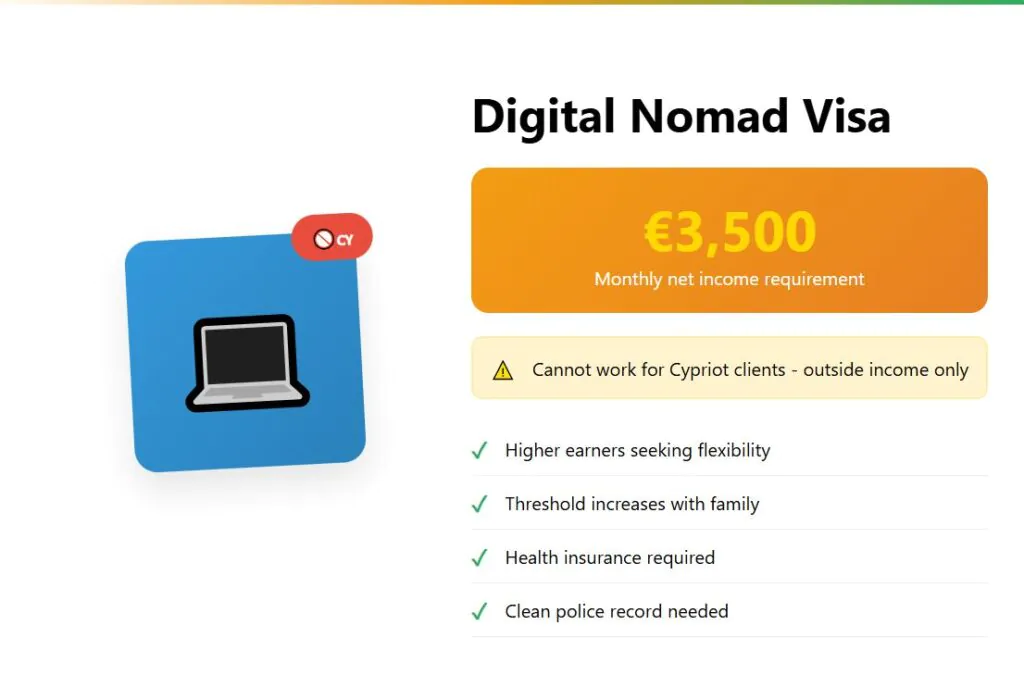
The second path, Category F, is aimed at retirees or people with passive income. The official income minimum is just €800 per month, but in practice, around €2,000–€2,400 per month is safer to ensure approval. You must also buy a property worth at least €100,000, and no work is allowed. It’s renewable long-term and can eventually lead to permanent residency.
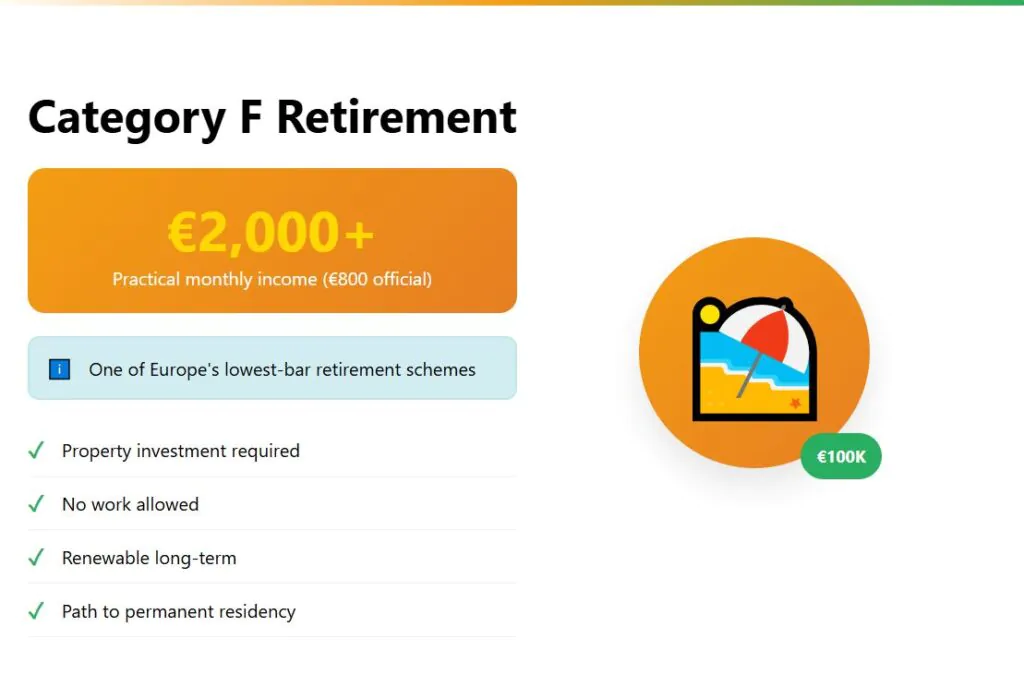
The nomad visa suits higher earners seeking flexibility, while Category F is one of Europe’s lowest-bar retirement schemes for those ready to invest in a home. No language exam is required and English documentation is accepted.
Cyprus scores 7 in “Requirements” for its low retirement bar and solid digital nomad option, and 8 in “Process & English-friendliness” for its English-friendly administration.
4 – France
France is one of the most requested countries when people ask me about moving to Europe as a retiree, pensioner, or remote worker.
The Long Stay “Visitor” Visa, or Visa de Long Séjour Visiteur, is especially popular among retirees and people living from passive income streams.
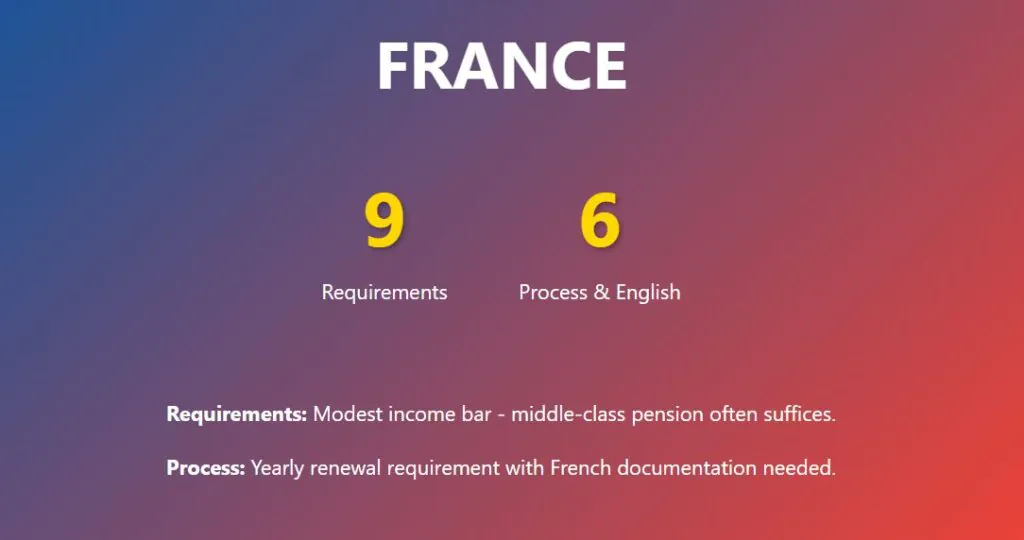
The visa is valid for one year, renewable annually, and after five years you can apply for citizenship or a 10-year residence card. The income requirement ranges from about €1,300 to €2,000 per month per person, with higher amounts for couples.
France doesn’t require massive savings or property purchase – a middle-class pension or Social Security check often suffices.
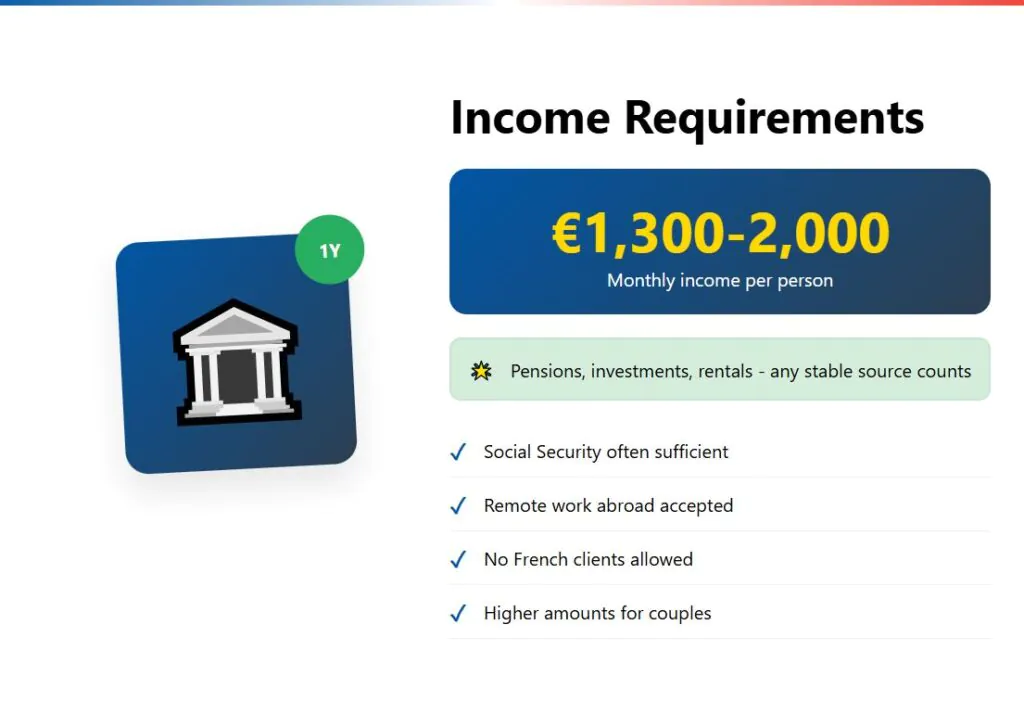
Any stable, verifiable source counts toward the income threshold—pensions, investment returns, and rental income are common.
Remote work for companies abroad is often accepted, as long as you don’t have French clients.
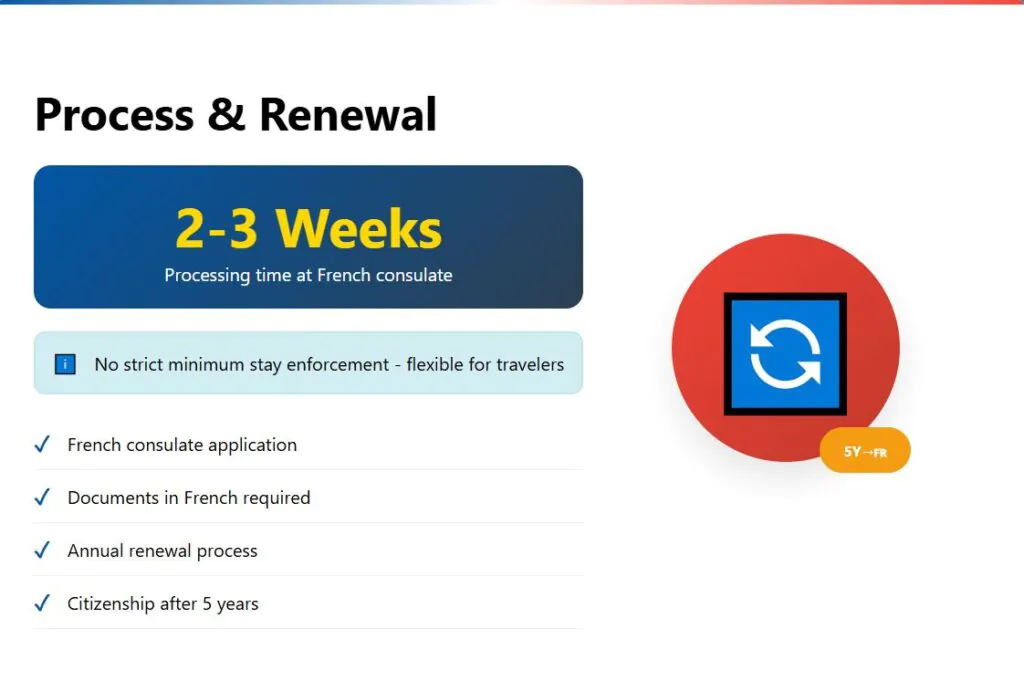
Another advantage is flexibility. While the visa is designed for residence, there’s no strict minimum stay enforcement, making it appealing for people splitting time between countries. You apply at a French consulate, processing usually takes two to three weeks, and documents must be in French or officially translated. Once in France, you validate the visa and renew it yearly.
France scores 9 in “Requirements” for its modest income bar and 6 in “Process & English-friendliness” due to the yearly renewal requirement.

3 – Bulgaria
Bulgaria is one of the most affordable countries in the EU, and it has a residence option built specifically for retirees. It’s called the Type D “Pensioner” Visa, which then leads to a renewable residence permit.
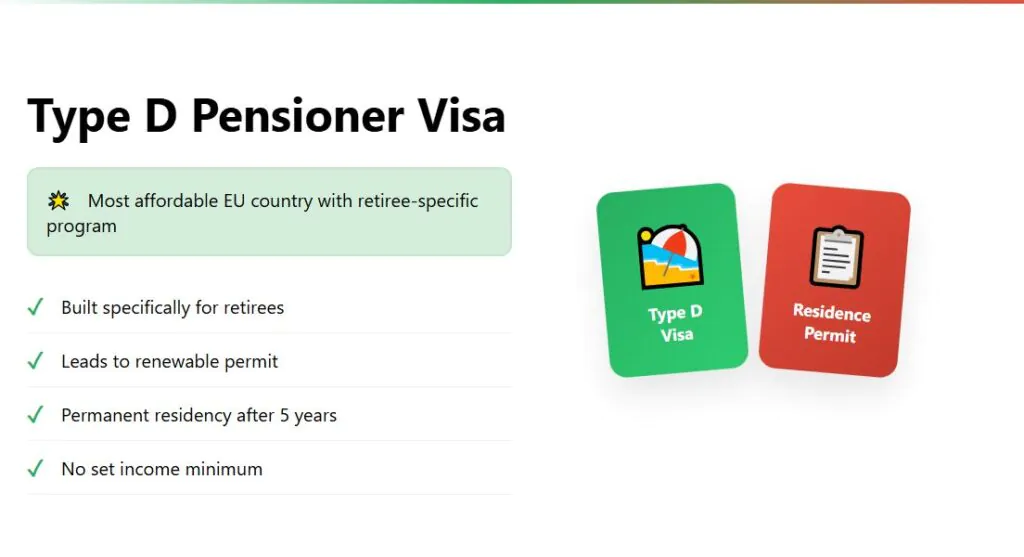
Stay five years on this permit and you can apply for permanent residency.
To qualify, you must be officially retired and receiving a pension. An official pension certificate is required as proof. There’s no set income minimum, only the need to show “sufficient means.” In practice, even €500 per month in pension income can be enough. Having a bit of savings and opening a local Bulgarian bank account can strengthen your application.
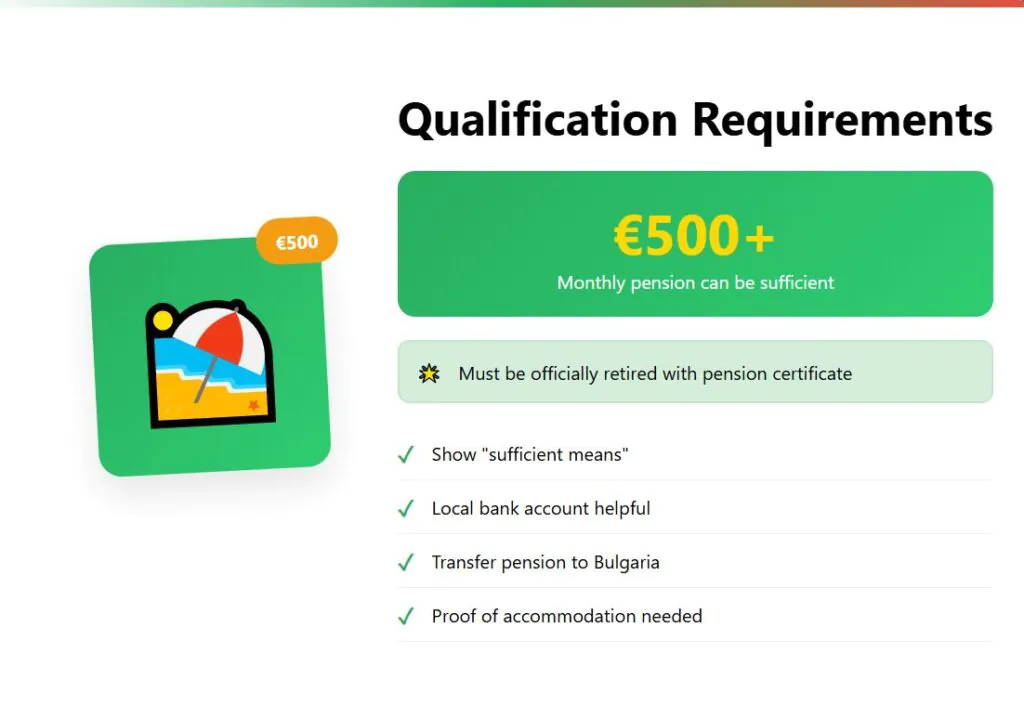
Other requirements include proof of accommodation—this can be through ownership, a rental contract, or an invitation from a host—plus valid health insurance, a clean criminal record, and a willingness to transfer your pension into Bulgaria.
You apply at a Bulgarian embassy, with all foreign documents translated into Bulgarian and apostilled. The Type D visa can take up to 45 days, after which you apply for the residence permit in Bulgaria. The process is paper-heavy, English is not widely spoken in offices, and most applicants use local agents to simplify it.
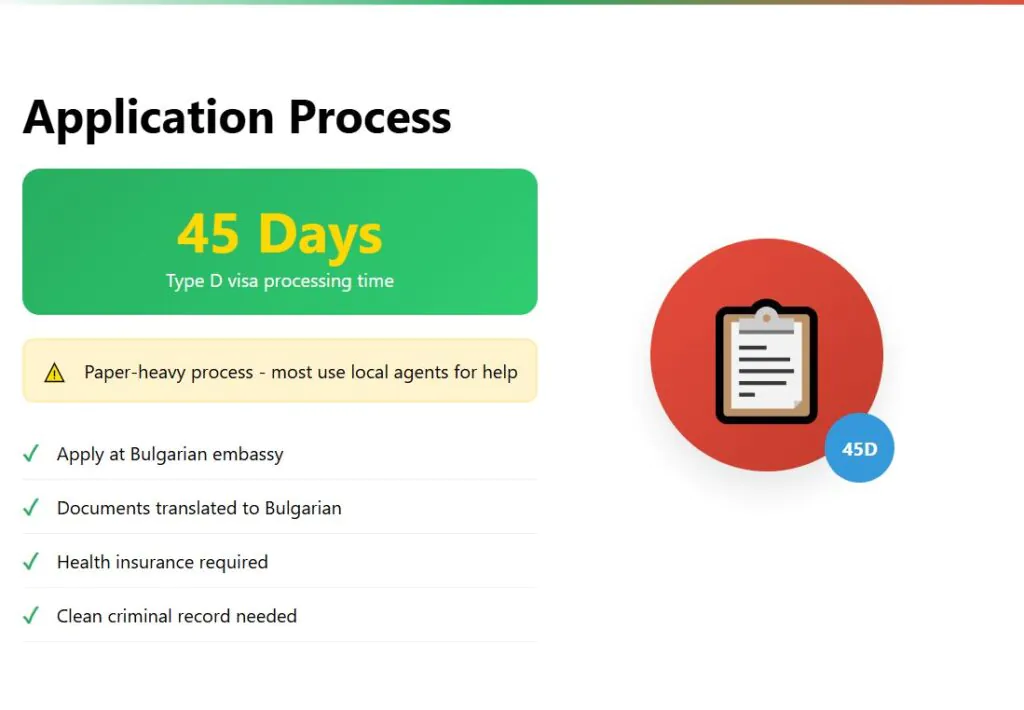
Bulgaria scores 10 in “Requirements” for its very low financial bar and 6 in “Process & English-friendliness” for having a relatively clear process but some language and bureaucracy hurdles.
2 – Greece
Greece has long been attractive for its sunny weather, relaxed pace, and one of the best tax schemes for expats in Europe.
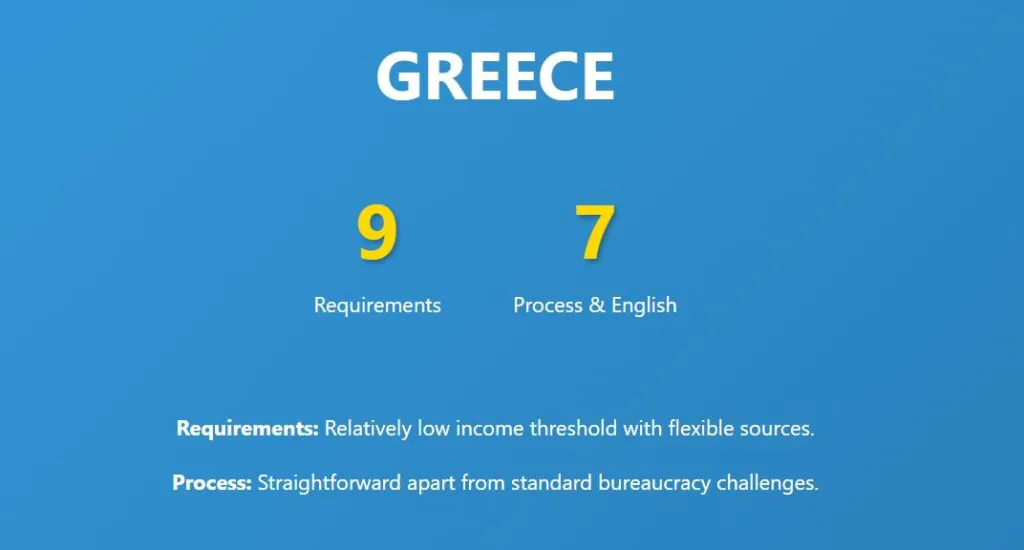
Greece offers two visa routes for non-EU citizens who want to live there: the Financially Independent Person visa and the Digital Nomad Visa, both with similar requirements. The FIP is for those not working, while the nomad visa is explicitly for remote work with foreign employers.
To qualify, you need an income of at least €2,000 per month for one person, plus 20% if a spouse joins and 15% for each child. This income can come from pensions, rental properties, investments, or remote work for employers outside Greece. No property purchase is required, there’s no age limit, and no language test to get the visa, though one is needed later for citizenship.
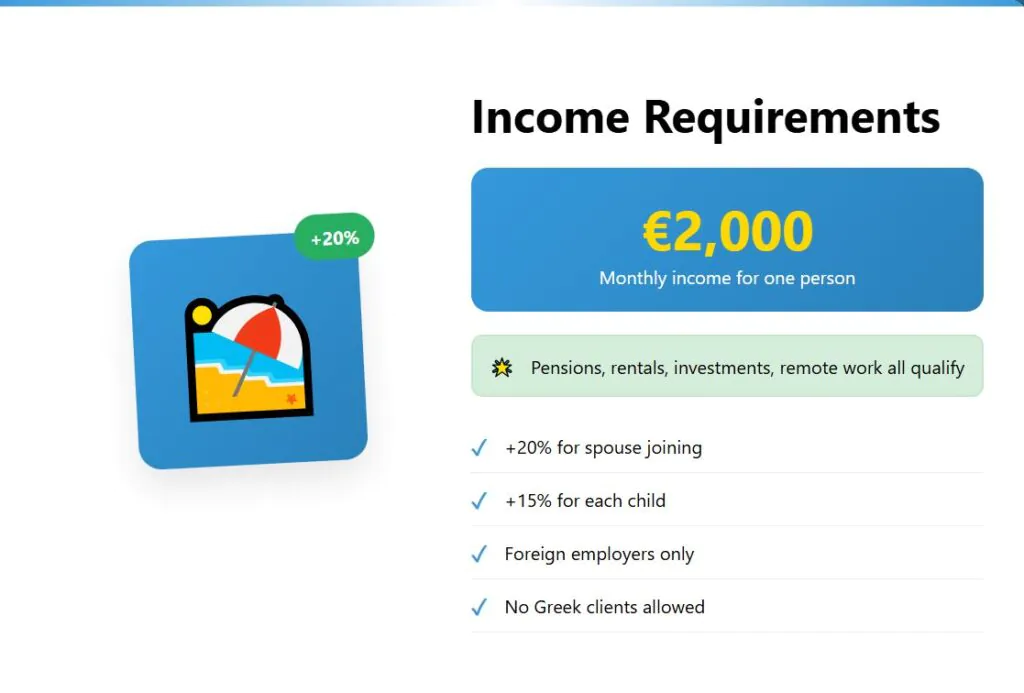
You must have proof of accommodation, valid health insurance, a clean criminal record, and, once resident, a Greek tax number. Officially, you should spend six or more months a year in Greece, though enforcement varies.
The process starts with applying for a National D visa at a Greek consulate, then obtaining the residence permit after arrival. The FIP is valid for two years, while the Nomad visa starts at one year and can be extended.
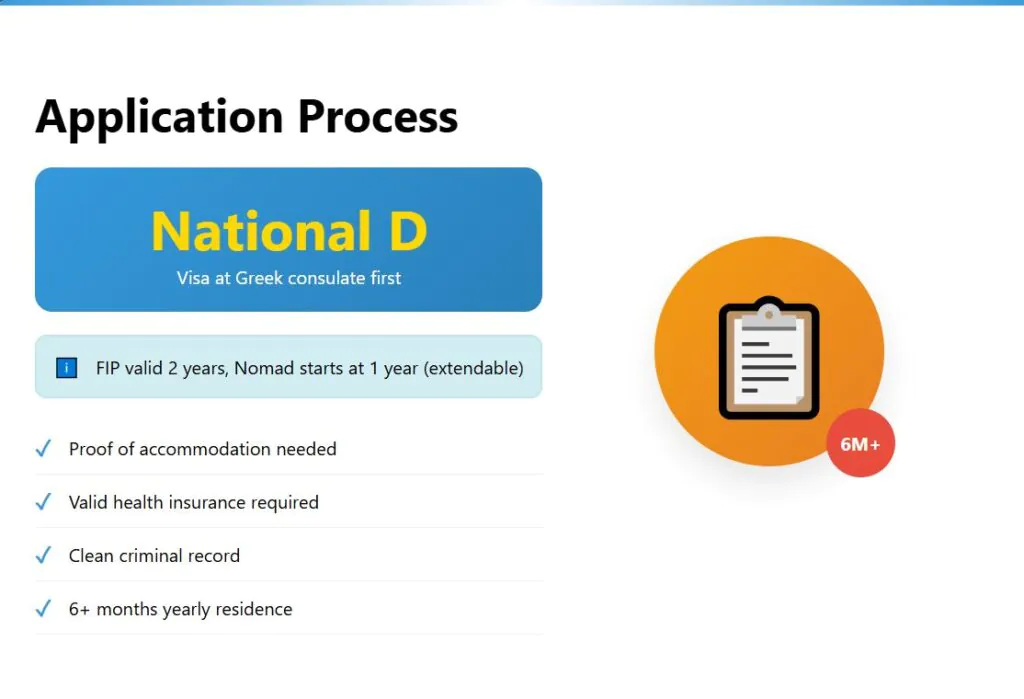
Greece scores 9 in “Requirements” for its relatively low income threshold and 7 in “Process & English-friendliness” for being straightforward apart from standard bureaucracy.
The Easiest Country in Europe to Obtain Temporary Residence: Portugal
Portugal ranks first because it combines very low entry requirements with a clear and proven process. Two visas cover almost every kind of financially independent applicant: the D7 Passive Income Visa and the D8 Digital Nomad Visa.
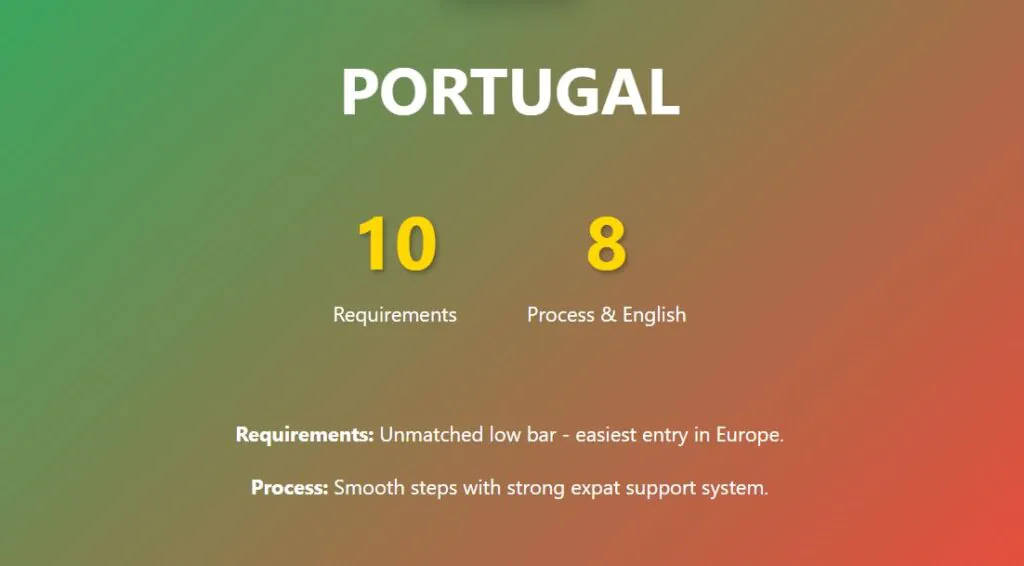
The D7, introduced in 2007, was built for retirees and people living on passive income. You need to show about €760 per month for the main applicant, plus 50% for a spouse and 30% for each child. Income can come from pensions, rental properties, dividends, or royalties.
You should also show savings equal to at least a year of living costs—around €7,500 for a single person or €12,000 for a couple—with more helping your case.
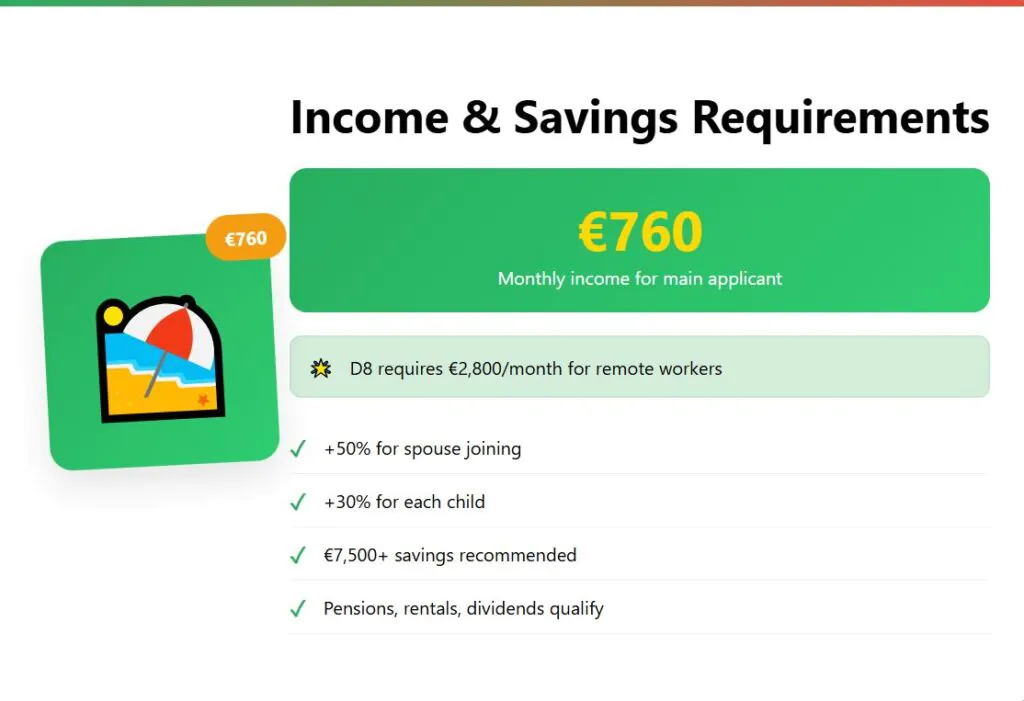
The D8 targets remote workers earning roughly €2,800 per month from foreign employers or clients, but otherwise follows a similar process to the D7.
Applications go through a Portuguese consulate with bank statements, income proof, a criminal record certificate, accommodation evidence, and a short motivation letter. The visa is valid for four months, during which you attend a SEF appointment in Portugal to receive a two-year residence permit.
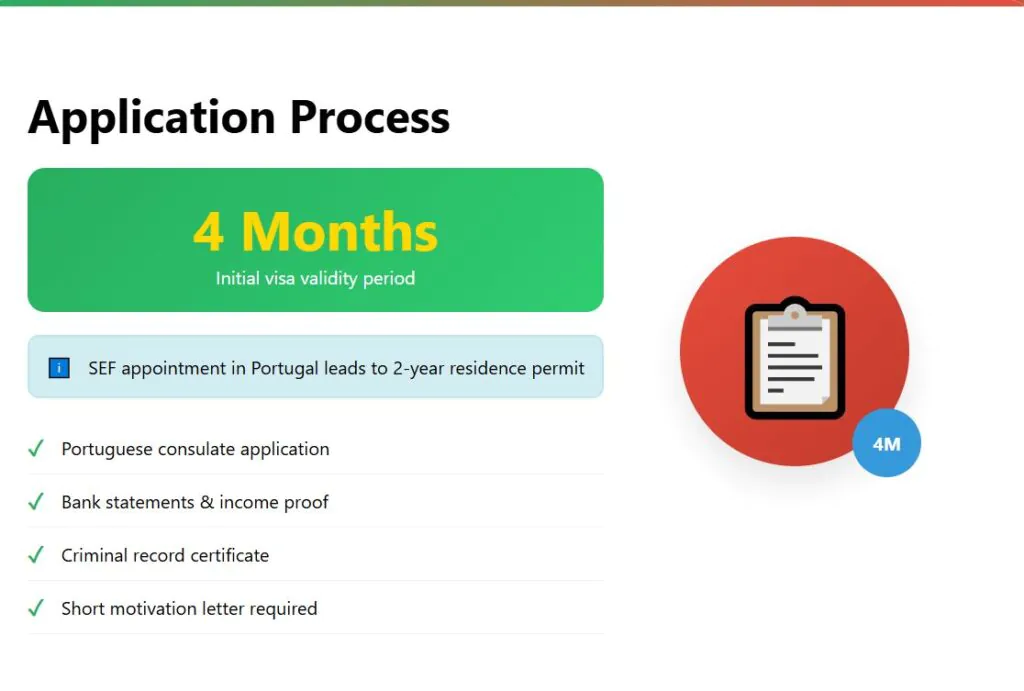
Portugal scores 10 in “Requirements” for its unmatched low bar and 8 in “Process & English-friendliness” for smooth steps and strong expat support.
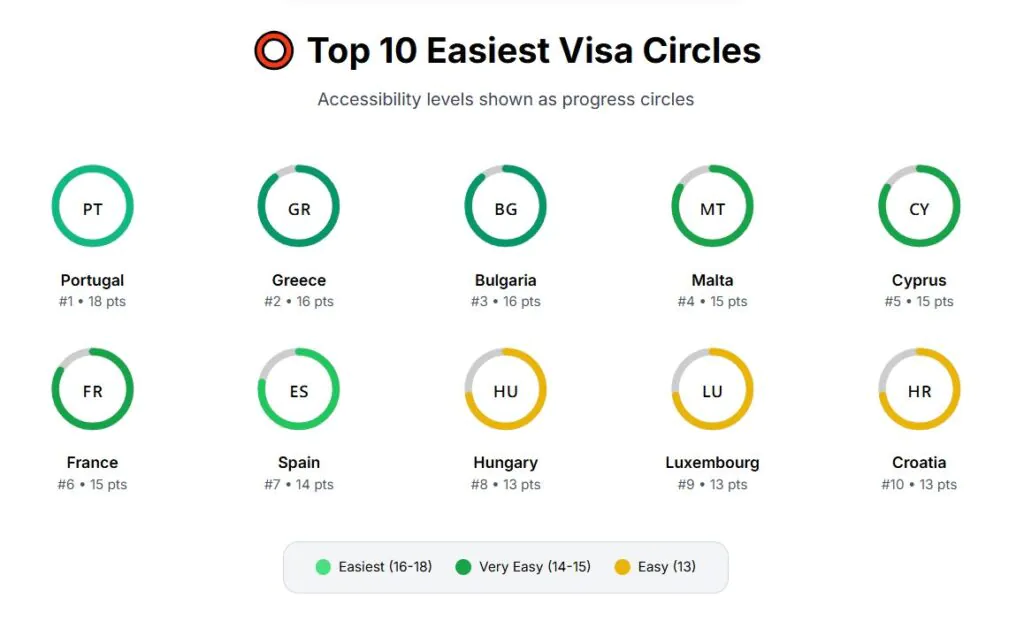
Now, once you get the temporary residence visa in Portugal or any of the countries we mentioned today, and live there for a few years, the next step is to get a permanent residence permit. It gives you much more stability, and even some other great benefits – like citizenship.
And for permanent residence, some countries are really hard, while others are extremely inviting. That is why I ranked the 27 EU countries on how hard or easy it is to obtain permanent residence. Some nations not only facilitate permanent residency but also offer streamlined pathways to citizenship. In fact, this has led many to explore the easiest European countries for citizenship, where the requirements are minimal and the processes are straightforward. Understanding these differences can significantly impact the decision-making process for expatriates considering long-term relocation. Additionally, for those with ancestral ties to certain nations, pursuing citizenship by descent in Europe can be a strategic option. This pathway often bypasses the lengthy residency requirements that other routes necessitate, making it an appealing choice for many.
Levi Borba is the founder of expatriateconsultancy.com, creator of the channel The Expat, and best-selling author. You can find him on X here. Some of the links above might be affiliated links, meaning the author earns a small commission if you make a purchase.
